






Following backlash towards the Oxford County Council proposal to cut streetlight hours across the county, plans have been deferred for further consultation.
The County Council currently operates 60,000 streetlights, with around 45,000 of these being in residential areas. The proposed scheme to switch off many of the county’s streetlights between 11pm and 6.30am could save £400k annually, and the Council also claimed that street lighting is the largest single contributor to

The Independent Schools Council(ISC) is a lobby group that represents over 1,400 private schools in the UK. Two weeks ago, it said it plans to sue the Government over a decision to impose a tax on private school fees. A quick search reveals that at least 10 of the 15 people on the ISC board of directors went to Oxford or Cambridge. Oxbridge academics and graduates have spoken extensively, just in the last five years, about assaults on the private school sector, “disadvantages” faced by white, privately educated men in admissions, and – as a Cambridge don argued two weeks ago – that universities should be more “exclusive and hierarchical.” These are minority views that seem to be materialising in systemic is-
sues that impact both the success of access programs, and how disadvantaged students at Oxford feel.
“ 93% of students in England go to state schools, but only 67.6% of Oxford-goers came from state schools.
93% of all students in England go to state schools, but only 67.6% of Oxford-goers came from state schools. School visits, talks, residentials, online courses, scholarships, college tours and application guidance are just a few things that colleges in Oxford are en-
gaged in, in the effort to change the material reality. 5.9% of school-goers in the UK are privately educated. But in 2023, private schools accounted for almost 30% of Oxford applications. This percentage does not account for students who met the AAA entry, but independently educated students are more than twice as likely to receive A or A* at A Level. This measure is still not reflective of the additional quality of education disparity between a “state school” student who went to a highly selective Grammar school and someone who attended an “inadequate” comprehensive secondary school according to Ofsted. For state schoolers who attend the low-ranking colleges for state-school proportions, the “state-private” and...
Continued on page 4
their operational carbon emissions.
Plans are to be discussed tomorrow at a cabinet member’s decision meeting of the Deputy Leader of Oxfordshire County Council. Ahead of this meeting, Councillor Pete Sudbury today expressed that the final decision would await further consultation with the public and police.
Backlash towards the scheme raised questions over the potential impact on the safety of the public, leading to petitions and statements expressing concern.
Continued on page 4
The rich get richer, or so they say. But for some students, their families’ wealth is only making them poorer at university.
The government has announced a 3.1% rise in maintenance loans for students for the 2025-26 academic year, equivalent to the rise in tuition fees.
For students studying at Oxford this is a £317 increase to the maximum maintenance; for
students in London, it is a £414 rise. The government states that the 3.1% rise is an increase in line with inflation, yet the maximum £414 extra fails to uplift student maintenance loans in real terms, leaving students struggling more than ever.
Money Saving Expert calculates that the 2024-25 uplift of 2.5% in maintenance loans fell “well short” of the actual 4% inflation rate, creating a “real-terms cut” for students.
Continued on page 10
Oxford High Street. Credit: Cameron Samuel Keys
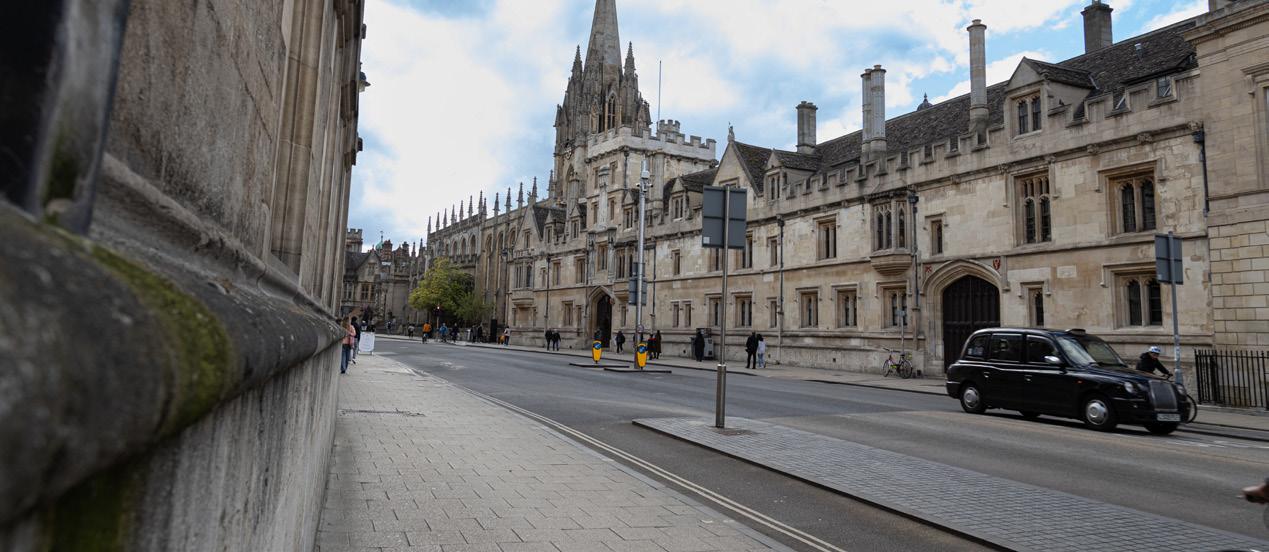



WUnion debate grows heated Culture
Univ Drama’s produc- tion of Othello, reviewed
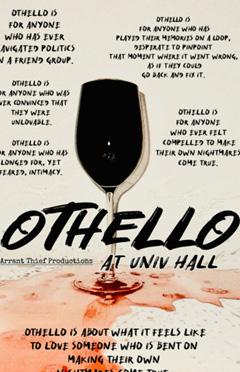
18

e’re in that weird midway part of Michaelmas term when everyone’s tired, we’re past halloween, and though Oxmas is fast approaching it’s definitely too soon for Christmas music. Or so I thought, yet somehow I found myself in Plush, in a Halloween outfit, singing along to ‘All I Want For Christmas Is You’. Baffling.
Slightly more seasonal were the fireworks that lasted about a week as everyone negotiated the fact that Bonfire night did not fall on a weekend. Like the Oxford bells, if they exploded, they punctuated the ambiance of the city and distracted me from my essay writing reverie. I got to

Fifth Blues has hit me really hard. Maybe it’s because, as a politics student, I cannot stophearing, reading, or thinking about the US presidential election. Or maybe it’s just that time of
Editorial Board
Georgie Allan and Amelia Gibbins (Editors-in-Chief)
Johannes Riese and Sabine ZednikHammonds (Associate Editors) Gaspard Rouffin (Director of Strategy)
News and Investigations
Anandita Abraham and Cameron
Samuel Keys (Heads of News)
Zohaa Butt, Caitlin Clarke, Canqi Li, Yunzhang Liang, Devika Marshal, Yashas Ramakrishnan, Gaspard Rouffin (Section Editors)
Comment
Yusuf Kungdol (Deputy Editor)
enjoy them from the window of my room, and the warmth of my independent heating system.
Less fun has been the task of covering the Union in recent weeks. All this fuss in the name of accessibility and the room in which this fuss is conducted isn’t wheelchair accessible - against the regulations of the institution and why typically meetings are not held in the Union TV room. This is to say nothing of the shouting and confusion which fill the room whenever anything is said.
Have you ever had that nightmare where everyone is laughing at you? I haven’t but I did get to live it in real life when I dared to ask a question in a Union meeting. The room went silent, everyone turned and stared and then they laughed, in my face. Welfare week could not have come at a better time.
year when Christmas seems far off, yet the days grow shorter and drearier. Whatever the case, I’ll try to cheer myself up and, by extension, you guys with this column (don’t get your hopes too high).
Firstly, as traumatizing, disappointing, and potentially disastrous as Trump’s victory might seem, at least I am not American, nor probably are you (I express my sincerest apologies to our American readers), and there is an ocean separating us. Trump’s election will, in all likelihood,
Emma Heagney, Rufus Jones, Ned Preston, Mariyah Saddique, Natasha Tinsley (Section Editors)
Max Thomas (Legal Correspondent)
Profile
Ananya Parakh (Deputy Editor)
Vivi Lei, Yashas Ramakrishnan, Mariyah Saddique (Section Editors)
Features
Faith Caswell (Deputy Editor)
Nicole Gibbons, Sophie Harrison, Emma Heagney, Nayana Juliette Syed, Natasha Tinsley (Section Editors)
Betsy Fricker, Rohan Kaya (Columnists)

Week 5 is finally here, and with it comes another edition of the OxStu to beat the blues.
This is our penultimate print edition of the term, which makes me feel as though time has gone by scarily fast this Michaelmas. As it’s mid-November already, Oxmas is in full swing for me (naturally).
This week at our lay-in, it was music to my ears when one of our Heads of News, Cameron, declared that we have ‘too much news’! Hopefully, you can find the highlights in this print edition of the paper - from Oxford Union antics to an investigation into library fees, this week has been quite varied, covering all bases.
I would like to thank the usual circle of people for their ef-
have devastating consequences for the international order and Europe’s security, especially in Ukraine. As dystopian and pessimistic as this may sound, our lives must still go on as normal. If you have been as consumed by the news lately as I have, take a break, and grab a pint or two (or three) with friends. We may still enjoy two blissful months before he once again occupies the White House.
Speaking of the pub, the one redeeming quality of November is the arrival of mulled
Culture
Eleanor Grant (Deputy Editor)
Nicole Gibbons, Sophie Harrison, Rufus Jones, Nayana Juliette Syed (Section Editors)
Shilpi Nanda (Columnist)
OxYou
Seth Saupin (Deputy Editor)
Jan Maciejewski, Lara Murrani (Section Editors)
Lara Murrani (Columnist)
Identity
Sami Jalil (Deputy Editor)
Willow Lock, Lucy Pollock (Section Editors)
Will McCaffery, Sharon Chau (Columnist)
forts over the past two weeks to make this edition possible - our wonderful team of deputy editors and section editors who have kept up morale and produced some very creative and insightful content. Our News Team in particular has gone from strength to strength over the past month or so, and it is so rewarding to see their growth in confidence and initiative.
I am also grateful to both of our associate editors, Sabine and Johannes, for their efforts - week 5 is a difficult week in many ways, but they have rallied the team together very admirably. As we look forward to the final print of term, all your work will be greatly appreciated, as always!
Finally, thank you to our wonderful Director of Strategy, Gaspard. All the way from Germany, you have been hands on to help whenever we have needed your expertise.
wine. I cannot indulge enough in that hot deliciousness, so try it out! Hot chocolate is also an acceptable alcohol-free alternative. Lastly, nothing cheers me up more than when people subscribe to the OxStu newsletter, which you can do via our website. Do me this small favor, as it drastically improves my relations with my EiCs.
Johannes Riese Keble College
Sport
Johannes Riese (Deputy Editor)
Zohaa Butt, Caitlin Clarke, Ned Preston (Section Editors) Haris Book, Gaspard Rouffin (Correspondents)
Science
Sabine Zednik-Hammonds (Deputy Editor)
Yunzhang Liang, Devika Marshal (Section Editors)
Bob Sira (Columnist)
Creative Rhea Kaur (Creative Director)
Amelia Woon, Caroline Kuba, Liv White, Mia Leahy (Illustrators)
Miranda Devine, Lloyd Dore-Green (Puzzles)
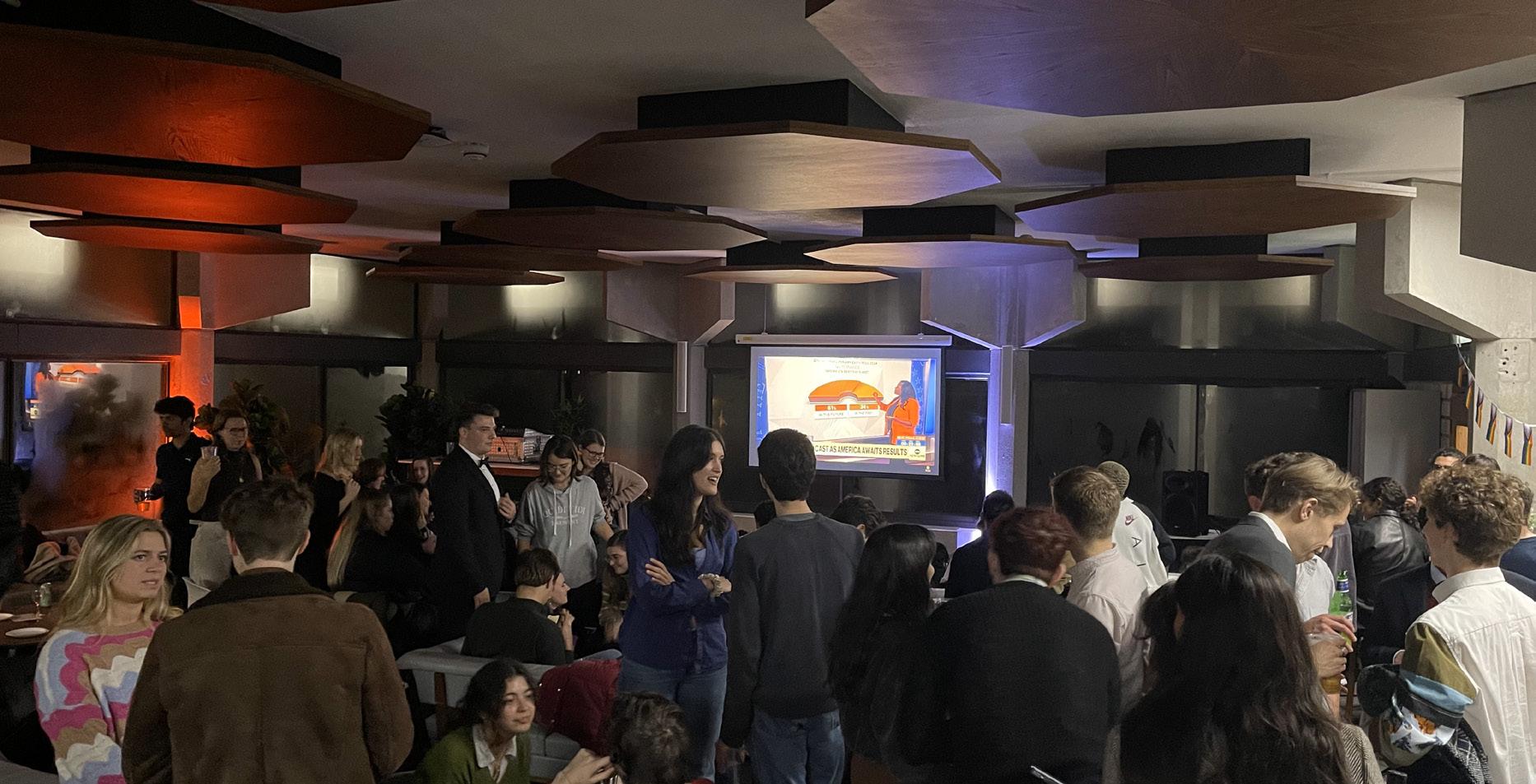
On November 5, the United States held its presidential elections with Republican Party candidate and former President Donald Trump elected as the 47th President of the United States, defeating Democratic Party candidate and current Vice President Kamala Harris.
There are approximately 2,000 students from the United States attending the University of Oxford, making them the second-largest group of international students. Over a 16-hour period beginning election night,
The Oxford Student spoke with five of these students as the votes were counted, each sharing their perspectives on the election and what they hoped for the future.
Josh, graduate student at Harris Manchester from Texas 18:43 5 November, approximately five hours before the first polls closed.
Asked how he felt about the elections, Josh said that being ahead in time zones from the US didn’t help his nervousness, as he wouldn’t be able to get the results the same night. “I don’t anticipate the election will be called within the next 12 hours.”
Speaking on election campaigns over the past year, he said:“It’s been really crazy because the nominee has changed for the Democrats… I really didn’t expect we would end up in a situation where it’s now Kamala Harris versus Donald Trump.”
“I think Kamala Harris seems to be polling a lot better than I had originally anticipated. She was super unpopular through a lot of her term as Vice President and a lot of that had to
“ At this point, all the feelings of the 2016 election are coming back up...
do with the general unpopularity of the Biden administration. I am very surprised now to see that it’s so close. In some ways, I thought a Harris-Trump match-up would be way worse for Kamala Harris and the Democrats.”
Palestine and “ending the genocide” was the main issue for Josh in the election: “I was really concerned that both of the nominees have not been good at all [on this issue].”
Josh said other issues important to him were local transportation, public school funding, and the abortion ban in
Oxford SU has released a set of ‘democracy proposals’ as part of its transformation plans. The proposals include changes to models of representation, changes to internal roles including the confirmation of the continued cut in sabbatical roles, and the abolition of no-confidence votes.
voting privileges to all students, college representative presence was optional, and not all students present were accountable to the SU – in one potential model, student representatives will now be “accountable to…rules and obligations of being an SU Representative and Trustee.”
Texas. Josh said he hopes that after the election, “things remain peaceful – both after the election itself and through the time the winner takes over.”
Emory, graduate student at St Antony’s from Utah 22:50, approximately one hour before the first polls closed.
Emory said she felt “extremely anxious” about the elections and the run-up to them. Having interned at the White House under the Biden administration, she saw the beginnings of the Biden campaign. “I knew that everything was going to change [when Biden dropped out]. So I’m hopeful about Kamala being in the run, but at this point all the feelings of the 2016 election are coming back up, and I’m realizing that hope can really quickly change.”
Emory observed the Harris campaign had “electrified” Democratic Party supporters in a way that wasn’t as present during the Biden campaign. “I think you did see that with Trump and with Trump supporters, but it’s been a while since I’ve seen a Democrat and Democratic campaign feel that excited.” When asked what issues were at the forefront during this election...
Read the full article online at www.oxfordstudent.com
The proposals set out a planned schedule for consultation beginning in Michaelmas 2024 and being finalised by the Transformation Subcommittee and SU Trustee Board in Trinity 2025.
This will include JCR and MCR presidents in the first instance, and will be put to students as a survey at the end of Michaelmas. All consultation over the next academic year will be subject to constant and ongoing review. SU President Addi Haran explained to The Oxford Student earlier in term: “Then, we’re going to take all of the data to see what the students want to be our purpose.”
New models of representation
The three proposed models include a ‘Union of Students’, a ‘Students’ Senate’, and a ‘Conference of College Rooms’. All three models change elements of the previous democratic system of the SU, the Student Council.
Previously, Student Council meetings did not extend
Some elements remain similar, such as the inclusion of a referendum in the Union of Students model, and key stakeholders.
“ The Council didn’t make sense in terms of democratic model...
When asked how the ongoing consultative, feedback-oriented system compares to the previous Student Council, Haran said that “the Council didn’t make sense in terms of democratic model… it required a lot of resources, a few full-time staff members to maintain. But what we’ve done in Transformation is actually to expand access to students.”
The “Union of Students” is a “direct democracy model” in which the SU will engage with students directly. It will meet once a term, and any student can attend. Key matters will be “subject to quoracy and may need to be verified...
Read the full article online at www.oxfordstudent.com


Contamination of the vacation storage area at St Hugh’s College has damaged student property and prompted calls for changing the storage system. The facility will be professionally decontaminated in 7th week.
The health and safety issues were attributed to students breaking the policy against storing food in the building. As a result, there has been “a significant pest control issue” which reportedly caused the College “substantial costs” in restoration.
Students collecting items from storage at the start of term reported seeing rats in the building, alongside droppings that contaminated some belongings.
In a comment to The Oxford Student, St Hugh’s said that in spite of “rules for safety reasons banning the storing of food in the vacation storage outbuilding, a number of students have nonetheless done so, resulting in a pest control issue”.
An email sent to students on 30th October also highlighted that “belongings are stored at students’ own risk”, which is set out in the St Hugh’s Student Handbook. This states that there is “a limited amount of storage space available for students’ belongings during the vacations”. St Hugh’s College commented consultation with the JCR and MCR committees will take place “to prevent this from happening again”.
Image: Wikimedia Commons CC BY-SA 2.0
Continued from page 1
...[the programme] from Liverpool went to my school, [which] was the best grammar school in Liverpool, and the other was an all-girls school with an entrance exam. The people from London went to Holland Park – [which is] called ‘socialist Eton.’” There is a quality of education disparity between a “state school” student who went to a highly selective Grammar school and someone who attended a comprehensive secondary school ranked “inadequate” by Ofsted. Outreach and access teams, too, are not too bothered by the state-private number, because their main concern is how to change access in the long-term.
Peter Claus and Nicholas Cole, who head the Pembroke OxNet programme, say that “if you focus on the state-private school dichotomy, you might end up including a lot of people from well-off state schools in London.”
Independent-state rates are widely seen as an indicator of socioeconomic advantage as well as privilege. But according to the Sutton Trust, a much better measure is the number of students who qualified for Free School Meals(FSMs). In 2023, only 7.6% of Oxford students were FSM-eligible, while 24.6% of pupils in the UK were eligible for FSMs. “[FSM students] are those we most want to work with,” said a head of the Oxford North-East program, Richard Petty. The North-East has the highest rate of students qualifying for free school meals, a fact he is sensitive to as each Oxford college will only run “access and outreach” to schools in their assigned area.
College outreach progress is being made – measured or not.
The North East programs annual report states that of the 29 schools that had students with offers, they had engaged with 27. Cole says OxNet gives students twice the success rate applying to Oxbridge, though OxNet doesn’t make this data as publicly accessible. However, because access programs depend on school management
being willing and able to cooperate on various programs, they might not target those they intend to. “[It depends on] whether schools are willing to put in resources,” Cole says.
“I feel there is room for improvement in access that differentiates…selective schools will push for more access programmes and visits…this is reflected in the proportion of state selective to comprehensive students,” added Lucy Beaumont, President of the Oxford 93% Club.
For many, Oxford’s “posho” culture has become an abstract, archaic thing. But for students from disadvantaged backgrounds, the exclusion is tangible. The Oxford Student spoke to students at the lowest and highest-ranked colleges on the state-independent proportion table. Rhea Kaur*, a student at Wadham(71.4% state) said she was the first person from her school to get into Oxford since its founding in 1920. “Oxford says the people here will be just like you, but you can’t find similarities with these people. It makes things really overwhelming.” The Hugh’s(58.9% state) student said “it’s much more disparate than expected.”
There are other ways in which the concerns of state-school students interact with the remit of access programs. Kaur, who is from a deprived area in Hounslow, recounts: “Some Oxford [students] from Somerville came to do a talk in a school in my area, and one of the guys who went said to me, ‘The area looks so run down and disgusting.’” The St Hughs student was unhappy that she “never had an email...about wanting state schooled pupils to volunteer.”
The student at Pembroke believes access programs should be “reaching out to the worst state schools in the country,” but the heads of OxNet, which is the Pembroke access program, said “trust issues” come in the way of building relationships with target schools. Private and grammar schools who are reputationally motivated care about the number of students
who get into Oxbridge, while Cole said some state schools are happy for their students to get into their “first-choice universities.” “My [secondary] school in the North West never really supported any kind of research into [access schemes],” Beaumont said.
“ This is a systemic problem – which access programs cannot tackle...
The previous Vice Chancellor said state schools should be “indict[ed]” for not giving their students better opportunities. But clearly, the governments who allocate funding have thus far privileged private school lobbyists. In 2023, Northern schools were losing out on “hundreds of pounds of funding per pupil” compared to those in London. 88% of secondary schools around England have faced real-term cuts since 2010. Recent news documented a third of primary school teachers reporting their pupils coming to school hungry, classes of 60 students for maths in South Wales, and and teachers in 32 sixth-forms striking as the Government did not confirm whether pay rises would apply to non-academised colleges.. It is unclear how much of a spending and commitment priority Oxford access is for these schools, or for their students. “We started this when schools were well-funded,” said Claus, the other OxNet head. This is a systemic problem – which access programs cannot tackle alone, through grassroots change. All the access heads hinted that outreach only works to a point. Jack Gillespie, an Outreach Ambassador at Teddy Hall, was dissuaded from applying to Oxford when he was at comprehensive school. He said: “The point of outreach…is to give those…who may have prematurely written themselves off, an accu-
rate picture of Oxford so that their decision to apply(or not) isn’t based on fear, lack of information or self-belief, or an outdated or stereotypical picture.” Meanwhile, state school students at Oxford say they were blindsided by life after the offer letter. Emma Heagney, an Access Rep at Merton, said: “...It’s good to help with applications and everything but it’s also about making Oxford a welcoming place that you actually want to go to.” Kaur says “if Oxford wasn’t Oxford I wouldn’t come here.” Access programs try to inspire confidence, one student at a time, but this is an uphill battle in a system where state schools, teachers, and students are disrespected. They have been disrespected by the Oxford student volunteer who called Kaur’s local area “rundown and disgusting,” and asserted – “I don’t think those are the types of kids who want to come to Oxford.” They are disrespected by the Cambridge alumni who cry “bias” against privately educated pupils, and by the Oxford-dominated Independent School Council that says its students are marginalised by university admissions but dreads them being “forc[ed]” into state schools as part of an “exodus,” and plans to sue the Government under a Human Rights Act. They are betrayed by this University’s refusal to push for change from above alongside change from below.
Meanwhile, Government statistics show stagnant, even falling numbers of kids on free school meals progressing to higher education. God forbid the tax revenue goes to compensating the teachers who reportedly spent their own money feeding kids in a costof-living crisis. Kaur said that the access team that “took the piss” out of locals in Hounslow had also gone up on the school’s stage to explain the benefits of an Oxford education. Apparently when they began to speak, “everyone started laughing.”
The University of Oxford has launched a new EDI (Equality, Diversity and Inclusion) Strategic Plan, under the slogan “Everyone Belongs”.
In a statement released on 4 November 2024 announcing the launch of the EDI strategy, Chief Diversity Officer Professor and Tim Soutphommasane and Principal of Mansfield College, Helen Mountfield KC said:
“The plan articulates for the first time, an EDI vision for the collegiate University and highlights four key objectives relating to our culture, our work, our diversity and our leadership. It outlines the approach that we will take and the work already underway in achieving these.”
The Collegiate University EDI Strategic Plan 2024-2027 was formally launched in October 2024, and focuses on four key objectives – Oxford’s
culture, diversity, work, and leadership – along with accompanying measures for progress as well as specific targets. The Plan outlines the vision, objectives, values and targets for Oxford’s EDI efforts for 2024 to 2027, stating “Our vision is for Oxford to be a collegiate University where everyone belongs and is supported to succeed. We strive to be a leader on equality, diversity and inclusion in society”.
“ We strive to be a leader on equality, diversity and inclusion in society.
The four key objectives are:
“Our Culture”, which seeks to strengthen a culture of belonging, “Our Diversity”, which seeks to increase staff and student diversity and representation, “Our Work”, which ensures teaching, re-
search and engagement practices are inclusive, and “Our Leadership”, which supports and models academic and professional leadership.
This comes after the latest EDI report, released in March 2024, highlighted areas of underrepresentation in the University, particularly amongst staff and professors.
The report identified a gender gap in academic roles, with female staff comprising just 28% of all professors and 22% of Statutory Professors. The EDI Strategic Plan aims to achieve a yearly increase in the proportion of female Statutory Professors to 26% by 2027.
There is also an ethnicity gap in academic roles. 9% of all professors and 8% of Statutory Professors are from BME backgrounds, compared to 18% of the population in the UK. The Plan aims to achieve a yearly increase in the proportion of BME Statutory Professors to 9% representation by 2029.

The EDI report also states that the gender mean gender pay gap as of 2023 is 19.1%. This is higher than the gender pay gap for all employees in the UK, which stands at 14.3% as of 2023. While the plan does not explicitly focus on the gender pay gap, it does pledge to ensure there are no statistically significant pay gaps between BME and white staff members.
According to the Plan, by 2027, trans and nonbinary staff should agree with the statement “I feel able to be myself at work” in line with the average for all staff. The proportion of trans and nonbinary staff agreeing with that statement in 2023 was 57%, compared to the staff average of 83%.
Read the full article online

Yusuf Kungdol is the Comment
Deputy Editor at The Oxford Student.
Aweek is a lifetime in politics - as the old adage goes. Well, a week on from the US election we appear to have finally reached relative normality - making it easy to forget that a week previous was the first Labour budget in 14 years. Having already suggested to the British public that tax rises were on the horizon, it was no surprise to see a return to austerity; a budget which would not have looked out of place delivered by George Osbourne rather than Rachel Reeves. Whilst they might appear to be completely independent events, it seems painfully obvious to me that if the Labour Party continues on their current trajectory British politics is going to be dragged into ‘Trump territory’. Firstly, it should be no surprise that Trump was able to win the Presidency; after all
the rise of right-wing populism is not limited to the US. . Across Europe leaders such as Viktor Orban, Giorgia Meloni and Marine Le Pen have displayed immense popularity, As regional conflicts threaten to spill over and become global issues there has been a sharp resurgence in support of hardline nationalists - and perhaps understandably so. It is in fact Labour that have managed to buck the trend of right-wing success, although frequent quips about them simply being Tories in Red are not without basis. It should be alarming however, that within four months Keir Starmer and the Labour Party in general appear to have lost the support of the British public. It is one thing for Labour to be unpopular, but the notion that this might push us towards a result similar to the
States is quite another. After all, it is not uncommon for incumbents to bear the brunt of the public’s anger; indeed elections in two-party systems are often deemed to simply be referendums on the ongoing premiership. What is alarming in this case therefore is not the lack of support for the Labour Party, but rather the polling figures enjoyed by Reform UK and their polarising leader Nigel Farage. Polling figures reveal that 29% are favourable to the Labour Party; for the Conservatives that number sinks to just 24%. Reform? 27%. Coupled with the fact that immigration appears to have taken over as the single most important issue for cast swathes of the electorate, Reform success might not be as distant as we imagine. Returning to the Budget, it should not be a shock to the
Labour Party that it proved unpopular. Slow leaks to the press were aimed at softening the blow for the public and political capital was spent to deliver it.
They assure us that it was an economic necessity and a message delivered with the heaviest of hearts - but this is no consolation to working people. In fact, one of the most significant challenges facing the Labour Party is to win back their tag as the party for the working class - they cannot afford to lose the support of both the wealthy and the working. This requires a delicate balancing act; one which is able to repel the appeal of both the Tories and Reform. For nearly a decade we have seen chaos across the pond; the threat of that same divisive rhetoric has never been more urgent.
Anuj Mishra
Students on the receiving end of late fees for overdue library books are now a decreasing minority, with most colleges and the Bodleian Libraries having abandoned their fine policies. While for most students, the amount of money blown on library fines each term won’t exceed the cost of a meal-deal, for some, they can be more than a minor annoyance. Library fines are the thin end of the wedge when it comes to the use of monetary fines as a disciplinary measure, and concerns have been raised that they perpetuate income inequality and add another layer to the already wide dis-
“ If you are one of the less sustainably endowed colleges, then the last few years have been really tough
parities between Oxford colleges.
The Oxford Student can reveal that of the 30 colleges investigated, only ten still charge monetary fines for overdue library books. The legacy of the pandemic Following the first lockdown of the COVID-19 pandemic in March 2020, the Bodleian Libraries and all college li-
braries temporarily suspended charging fines for overdue library books. However, as libraries returned to their regular operation over the following years, a discrepancy emerged.
Some colleges were quicker than others to resume charging library fines, and many never resumed their original policies at all. Data obtained by a Freedom of Information request reveals that while some colleges –such as Keble College and St Edmund Hall – reintroduced library fines in Michaelmas Term 2021, others – such as Oriel College – did not follow suit until Trinity Term 2023.
The Bodleian Libraries, which manages the University’s 26 central libraries, never resumed their fines policy following the pandemic, formally abandoning it in August 2022.
A spokesperson for the Bodleian Libraries told The Oxford Student: “The decision [to stop charging fines] was motivated by both the impact of the pandemic and a desire to be as fair and compassionate to our students as possible, at such a difficult time. There was also a general movement in university libraries away from charging fines.”
The decision was made despite the major profitability of the Bodleian Libraries’ fines policy, which raised over £150,000 during 2016 to 2017, the most of any UK university. Regarding this, the Bodleian Libraries spokesperson added: “Fines have never been a means of income generation
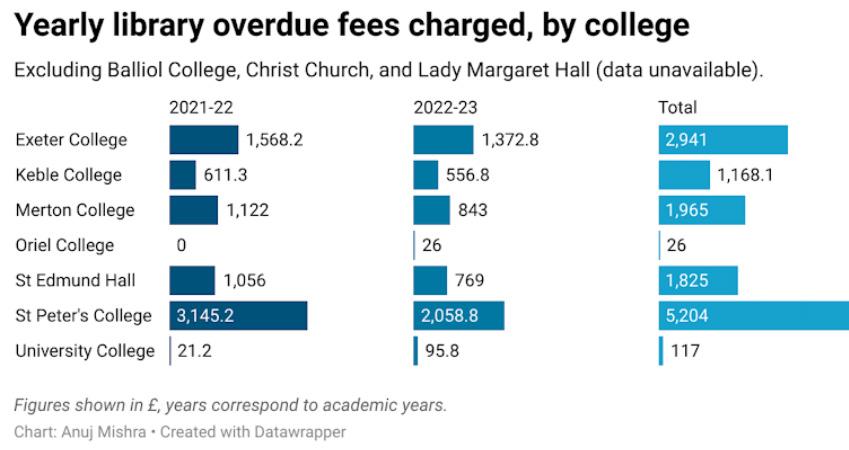
for the Bodleian Libraries or the University, so the decision has not impacted our yearon-year finances.”
There are ten colleges still charging fines for overdue books: Balliol College, Christ Church, Exeter College, Keble College, Lady Margaret Hall, Merton College, Oriel College, St. Edmund Hall, St. Peter’s College, and University College.
The most recent college to drop its library fines policy was St. Catherine’s College, which did so at the beginning of Michaelmas 2023 owing to the RAAC issues affecting use of its library.
Current fine policies
The toll for forgetfulness fluctuates across the colleges which still charge fines for overdue books, with dai-
“ The decision to stop charging fines was motivated by both the impact of the pandemic and a desire to be as fair and compassionate as possible
ly charges varying and some colleges adopting maximum charge caps.
For example, students at Exeter College, which collected nearly £3,000 in late fines from 2021 to 2023, are charged 20p per day for overdue books, while students at Keble College, which made around £1,100 over the same period, are only charged 5p per day.
At Lady Margaret Hall, which charged over £3,300 over the same period, students can be fined up to a maximum of £10 per book.
While most colleges do not continue to charge fines for overdue library books, they all charge for the replacement of
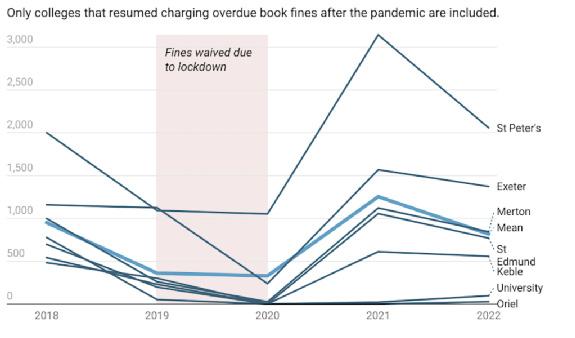
lost and damaged books.
Libraries which have abandoned their fines policies now rely more on reminders for overdue books, with a ban on borrowing being the usual last resort. The Bodleian Libraries have adopted a policy whereby a book auto-renews until it is requested, a Bodleian spokesperson added: “Failure to [return a book] results in the reader being blocked from borrowing any further items across all Bodleian Libraries until the issue is resolved. Students are only charged for lost titles.”
An unequal price to pay
The disparity among college fine policies bolsters concerns about the inequality of student experience among Oxford’s colleges. This topic has come to the fore following the publication of the College Disparities Report by the SU earlier this year in May.
Responding to the revelation that St Peter’s College has consistently charged the most library fines over recent years, St Peter’s College JCR said: “[We] strongly disagree with the ongoing library fine policy, particularly as it disproportionately impacts students from lower-income backgrounds. [...] St Peter’s continues to have the fourth-highest accommodation costs in the university and other policies such as the College’s uPay prepayment system.“We’ve seen firsthand how these policies affect students; some of our JCR members have been forced into their overdrafts just to cover basic living expenses, and library fines only add to this burden. The JCR is
actively working to push for a more equitable system that doesn’t place an unfair burden on those already struggling.
“ Sometimes you you have to kind of look after yourself as well in order to preserve the energy for the job
”St Peter’s College declined to give comment, but did add, as context, that the college has “a process by which students experiencing financial hardship can, and do, have their library fines waived.”
The SU Class Act campaign said: “Charging students fees, including fines for overdue books, can disproportionately impact working class students, even if the financial burden of occasional late fees may seem minimal.
“While the majority of colleges have moved away from charging late fees following the pandemic, there remains a concern about the inconsistency across colleges.
“Class Act support progressive approaches like termlong loans and indefinite renewals, which reduce the pressure on students, especially those from working-class backgrounds, who are already balancing multiple challenges.”
Read the full article at www.oxfordstudent.com
Emotions ran high at tonight’s Union debate as private business took over an hour to conclude, leading guest speaker 91 year old Michael Hesseltine to leave before opening arguments. The evening began with the resignation of Union Librarian Aryan Dhanwani who, following an email sent to the Standing Committee yesterday outlining his concerns with the current governance of the Union, stated “We have failed to uphold the rules of the society.”
Dhanwani’s concerns were caused by a series of disputed decisions made by the President of the Oxford Union Ebrahim Osman-Mowafy, centred on Monday’s Standing Committee meeting and the validity of the votes taken on rules amendments proposed by Siddhant Nagrath. This included an attempt to filibuster the meeting, causing sched-
uling issues with individuals opposing Osman-Mowafy’s rules reforms, known to have other commitments, and two adjournments to calm the situation in the room.
Following the first such adjournment, former President Hannah Edwards left, having submitted an absentee ballot to a Deputy Returning Officer “just in case”, in spite of long standing rules prohibiting such votes. However, Dhanwani in his letter claimed “Hannah Edwards was unfairly denied the opportunity to cast her vote”, leading the President to move the motion, which passed 13-6, narrowly meeting the required two-thirds majority, which it would not have if Edwards vote had been counted.
Dhanwani further alleged that Ex-Librarian Isabelle Horrocks-Taylor and former President Ahmad Nawaz had “registered to vote after the deadline” and so “non-members of the Standing Committee participated in those
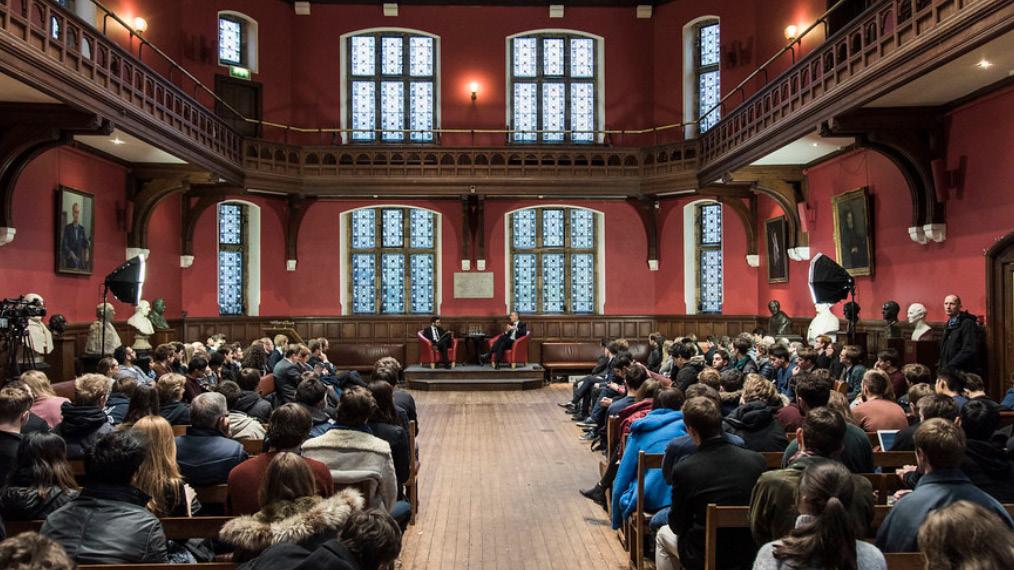
votes”. Without these votes, then the motion would not have passed.
The meeting resumed for the final time with the President Elect Israr Khan, seeing all who were present, allegedly saying ‘All our people are here go, go, go’ and the motion was brought to the Standing Committee for the third time. This third vote occurred with one member of the governing body who entered after the adjournment asking ‘What the hell are we voting on?’
Following Dhanwani’s res-
ignation and in spite of his protestation at the validity of the proposal brought by Secretary Siddhant Nagrath, the first half of the controversial rules changes which were first attempted at the beginning of this term were brought to a vote.
Outside the chamber during the closing stages of the debate The Oxford Student has heard from multiple sources that a copy of Cherwell was doused in alcohol and set alight using a lit cigarette. Read the full article online at www.oxfordstudent.com

American political scientist John Mearsheimer, from the University of Chicago, spoke at the Oxford Union last Wednesday, sharing his perspectives on the ongoing conflict in the Middle East and the Russo-Ukrainian war.
Mearsheimer is widely known for developing the structural realism theory of international relations, which
argues that the primary motivation of states is to maximize their power in an anarchic international system.
This was Mearsheimer’s second appearance at the Union, previously speaking in November 2022.
Mearsheimer argued that Israel is in “deep trouble” and faces a worsening situation due to three competing conflicts: Hamas in Gaza, Hezbollah in Lebanon, and a direct conflict with Iran.
Mearsheimer described Israel’s policies in Gaza and the West Bank as amounting to an “apartheid state”. He added, “If you were Palestinian, you’d be interested in changing the status quo too. Who wants to be the dominated group in an apartheid state?”
“What the Israelis ultimately want to do is they want to cleanse Gaza, and they want to cleanse the West Bank.”
Mearsheimer stated there was “no question” in his view that “Israel is now in the process of executing the genocide.”
Addressing Hezbollah, Mearsheimer observed that Israel’s ground incursion into Lebanon was like “going into a hornet’s nest” due to Hezbollah’s military strength and missile and rocket capabilities. He views Israel’s inability to settle the conflict with Hezbollah as a serious ongoing threat, particularly to the northern regions of Israel which bor-

- Peter Lenahan
The Debate motion for this week was ‘This House would Rejoin the EU’, having speakers examine the political, economic, and cultural consequences of the referendum in 2016. The debate began with a significant absence: Lord Heseltine, a planned key speaker, had to leave after initial squabbles disrupted the proceedings.
A notable speaker was Lord Liddle who opened with an impassioned call for closer ties with the EU by using Churchills speech requesting a United Europe. Sir Desmond Swayne countered, calling “rejoin” a “fundamental problem,” pointing out that the EU today is fundamentally different from the one the UK left, with the “Franco-German alliance shattered” and a continent grappling with “the rise of the far right.”
der Lebanon. Since 8 October 2023, between 60,000 and 70,000 Israelis have been forced to evacuate.
On Iran, Mearsheimer contends that Israel wants “to drag Iran and the United States into a war” with the objective of destroying Iran’s nuclear facilities and precipitating a “regime change” in Iran.
Mearsheimer characterized Israel’s overarching goal to “create a new Middle East that is much more friendly to Israel and much more friendly to the United States” as “delusional”. “[Iran does] not want to get into a fight with Uncle Sam. Uncle Sam does not want to get into a fight with Iran.”
Responding to an audience question, Mearsheimer acknowledged limitations to his structural realism theory. which downplays the influence of leaders or ...
Read the full article online at www.oxfordstudent.com
Another proposition speaker, Rachel Johnson, emphasised the generational impact of Brexit, noting many in the room “did not vote leave” calling it “generationally unfair.” Baroness Fox, however, instead urged a forward looking approach, arguing that Brexit started a “democratic revolution” and dismissing a return as nostalgic and detached from reality. The proposition won the vote, with 78 ayes to 54 nays, reflecting a slim but clear support for rejoining the EU.
Notably following the debate a Cherwell magazine was doused in alcohol and set alight causing rumours to grow claiming it was thrown at a member of the Union. However, these remain to be unverified.


The Norrington Room, Blackwells. Credit: Flickr
Emma
I’m currently reading On the Road by Jack Kerouac. I curl up with page 1 in front of me and before I know it I’m halfway through, enthralled by Kerouac’s Beat Generation references but unable to fully immerse myself. I’m just itching to add it to my Goodreads. Something about reading a physical book just feels right. Maybe it’s the sense of tradition, or that new-book smell.
Reading is undeniably chic again—but why?
In the season five episode of Gilmore Girls titled ‘Say Something’, we see Rory Gilmore in a witty graphic tee, sporting the phrase Reading is Sexy.

trees to be destroyed annually. If anything, e-reading is probably the way to go, at least until the thrifting trend extends to support second-hand book shops.
The TikTok revival of the show has, inevitably, inspired a new generation of Rory Gilmores. Reading is but one of the constituent parts of a distinct aesthetic—autumn leaves, hot coffee, even the beauty of
Admittedly I speak as an out-
gated by a general culture of

tellectualism aside, I would argue that the very nature of the community encourages needless overconsumption.
The internal pressure for me to finish On the Road is just
“
Subconsciously all I want is the feeling of being ‘well read’.
overconsumption in general may point to something worrying for society at large.
“
The TikTok revival of the show has, inevitably, inspired a new generation of Rory Gilmores.
A mix of (guilty) materialism and competitive spirit mean that I still can’t fully engross myself in On the Road.
if you will (as we’ve learned, reading is sexy).
Fundamental to the reading renais sance is ‘BookTok’.

‘tropes’ and ‘aesthetics’ respectively, the incessant need to post fresh book or fashion content on line. Perhaps it’s a good thing that young peo ple are discov ering how fun reading can be, albeit through low-stakes, hy per-consumable YA (young adult) novels. But as we have seen, the disposable culture fostered by BookTok and
My reading list for next term is mountainous enough that reading for pleasure has also become a chore. There’s nothing wrong with Kerouac—in fact, to be completely honest, On the Road is one of the best books I’ve

Maybe one day in the future, my identity and my reading habits will finally feel somewhat separateto me. But, for now, I will keep on resisting the temptation to skim through books, and will maybe start something else entirely.
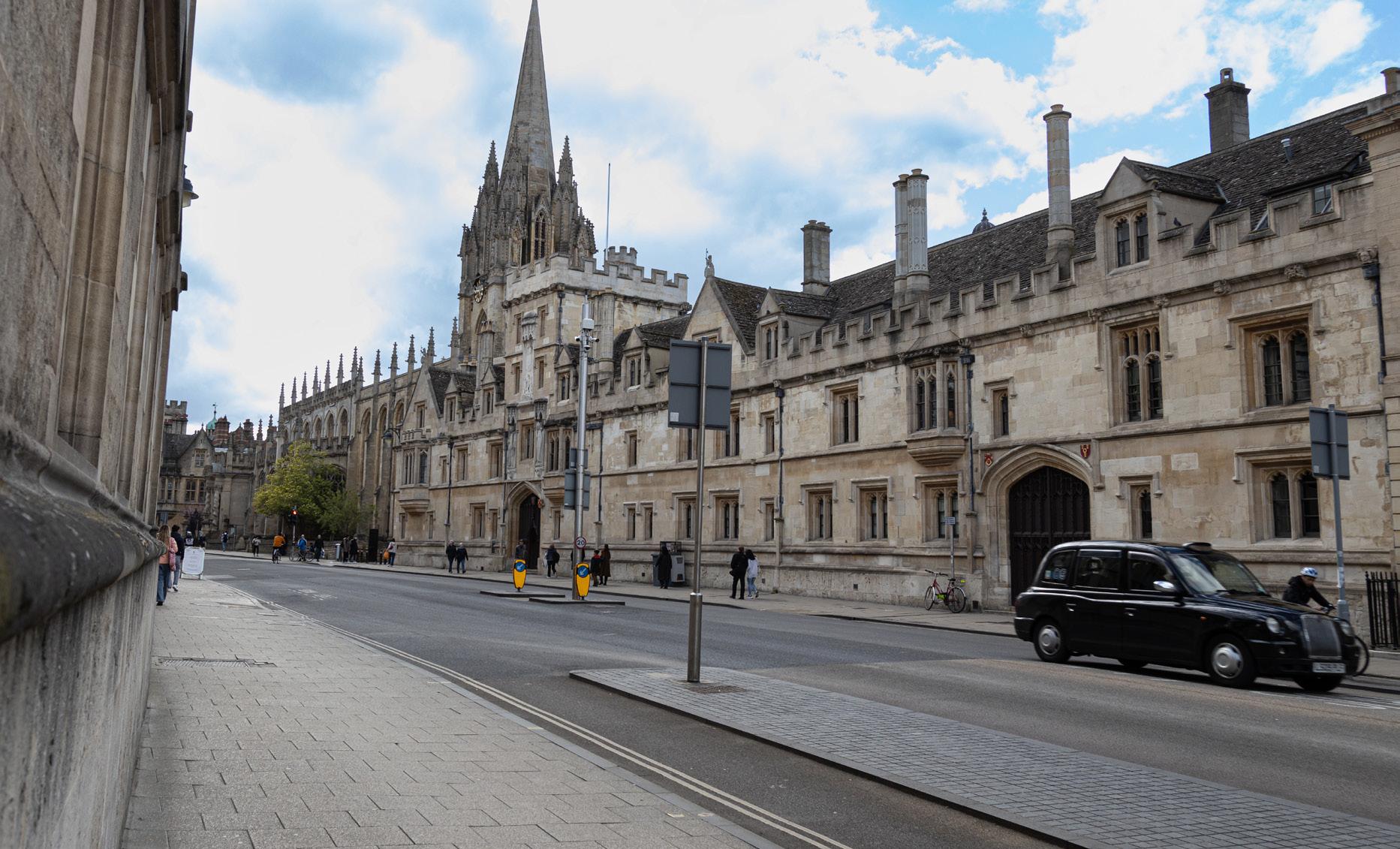
ernment provides financial support “to students from higher income backgrounds”, suggesting that SFE should stop funding students whose parents could, she assumes, support them through their degrees. But, as the former vice-chancellor of Sheffield Hallam University, Sir Chris Husbands, pointed out, making any changes with such faith in parental financial support would further “infantilise” these students and heavily endanger their independence.
“The government says that, depending on your household’s income, your parents may have to contribute towards your living costs while
Based on the government’s figures, they calculate that maintenance loans needed to rise by 15.5% last year “to maintain the value of the support in real terms”, as compared with the 2020/21 academic year.
The hardest hit are often a forgotten group: students on the minimum maintenance loan with no financial family support.
Means testing students’ families is supposed to be the fairest way to calculate student
University. Sasha’s parents’ income is over £62,347, mean ing that she is only entitled to the minimum maintenance loan of £4,767 annually, but because her parents don’t supplement that money, she’s been left “physically exhaust ed” trying to support herself financially at university.
“I spent the Christmas hol idays in a constant state of stress,” says Sasha, who spent her holiday working flat-out at
“ Means testing is supposed to be the fairest way to tainence loan is often not enough to cover rent.
ous with money”, Ellie says. But it is her ‘household’s’ fractious relationship and her mum’s neglect that has made her dependent on her stepdad, creating a “weird power balance.” Financial support is sporadic, unreliable, and “quite mood dependent.” In her first year of university her mum lied to her stepdad, failing to match
“ Financial support is sporadic, unreliable and mood dependent.


accommodation is £5,723.22 and further years accommodation with longer tenancy agreements starts at a whopping £7,760.16. At Bristol, the cheapest (shared) rooms cost £4404.96 for 38 weeks, leaving just £362.04 a year for a student on the minimum loan to spend on food, activities, and emergencies. Under £1 a day.
Dame Margaret Hodge has questioned why the gov-
dad (her actual dad is absent), there is less obligation to support her university studies.
Being a student put her “in a dependent position. And I didn’t need to be.”
“My stepdad is really gener-
beware - the government disagrees. They’re expecting you to help. The government assumes parents can and will support their student children, assumptions which can leave students exhausted, vulnerable, and unable to pay their rent. The student finance system relies on the Bank of Mum and Dad, but for some students it is closed for business.

The Tories are attempting to rebound from a crushing electoral defeat that ended 14 years in power. Outspoken and right-leaning Kemi Badenoch has been named leader of the Conservative Party. The first black woman to lead a major political party in the UK, Badenoch pledges to “renew” the British opposition.
Advocating for a free-market economy with a smaller state, Badenoch in many ways represents a typical Tory leader. In others, she fits a new profile as the following five changes for the Conservative party demonstrate...
Despite Prime Minister Keir
Starmer insisting there are “real dividing lines” between Labour and the Conservatives, the two parties have begun to look increasingly similar in the final years of Tory rule.
The two main parties have sharpened their differences.
After Badenoch’s victory and Labour’s recent Budget plans to “tax, spend, and borrow”, the two main parties have sharpened their differences and are less bogged
in her confrontational style. Badenoch has since agreed she may need a softer approach.
Alongside the perceived deterioration of public services, higher taxes, and more immigration, Partygate played a big role in the Tories’ landslide defeat. Rather than apologising like Johnson or Sunak, Badenoch stated the scandal was “overblown”. Slammed for belittling lockdown followers and bereaved families, there is a worry her straight-talking does not bode well for the party.
“
There is a worry her straighttalking does not bode well.
The Tory membership is the whitest, oldest and, by definition, most conservative of electorates. Meanwhile, Badenoch’s triumph shows Britain’s top jobs are increasingly occupied by more ethnically diverse groups.
Despite the Conservatives’ shift in attitude towards race, this will not necessarily secure the vote of black, minority, or migrant groups. Badenoch’s robust attitudes to gender and race have left many wondering whether she is actually out of step with multicultural Britain.
boasting about being the first woman to serve as Chancellor of the Exchequer. Despite showing that the Tories have successfully helped nonwhite males into positions of power, Badenoch is far from being a champion of minority causes.
Many MPs are cursed with a rather parochial view. Often raised in small towns, they tend to join parties at a young age without having travelled. Badenoch is unusual having grown up in Nigeria until the age of 16 and describes herself as a “first-generation immigrant”. Despite recognising her privilege, she recalls flipping burgers and cleaning toilets at McDonald’s as a teenager.
When it comes to understanding the working class, former Prime Minister Rishi Sunak tried desperately - and often unsuccessfully - to rid himself of his “out of touch” reputation. Badenoch, however, is perhaps more convincing in her claims to understand ordinary people and likely has a better instinct for identifying with the rest of the world.
down on centrist ideology.
An “anti-woke warrior” fighting against “left-wing nonsense”, Badenoch was a passionate Brexiteer and supporter of the much-ma ligned Rwanda deportation plan. Under her leader ship, moderate Tory MPs could be side lined and even lose the whip in favour of staunch right-wing backers.
Badenoch has been praised by former Prime Minister Boris John son for bringing a “much needed zing and zap” to the party. Others, however, ac cuse her of being abrasive - urging the leader to rein
As a result, her representation alone is not necessarily seen as a win for the black community.

As the Conservative Party’s fourth leader in just over two years, it remains to be seen whether Badenoch will still be leader of the Tories heading into the next general election. One of her toughest tasks is striking the balance between speaking her mind and avoiding further division between her own MPs - let alone the electorate she is supposed to be representing.
“
Badenoch in many ways represents a typical Tory leader.
By restoring unity among the Conservatives, she will be one step closer to fulfilling her pledge for “renewal”. Badenoch certainly promises to be different, but is her shifted emphasis enough to win back a British public that is greatly disillusioned with the Tories and all they stand for?
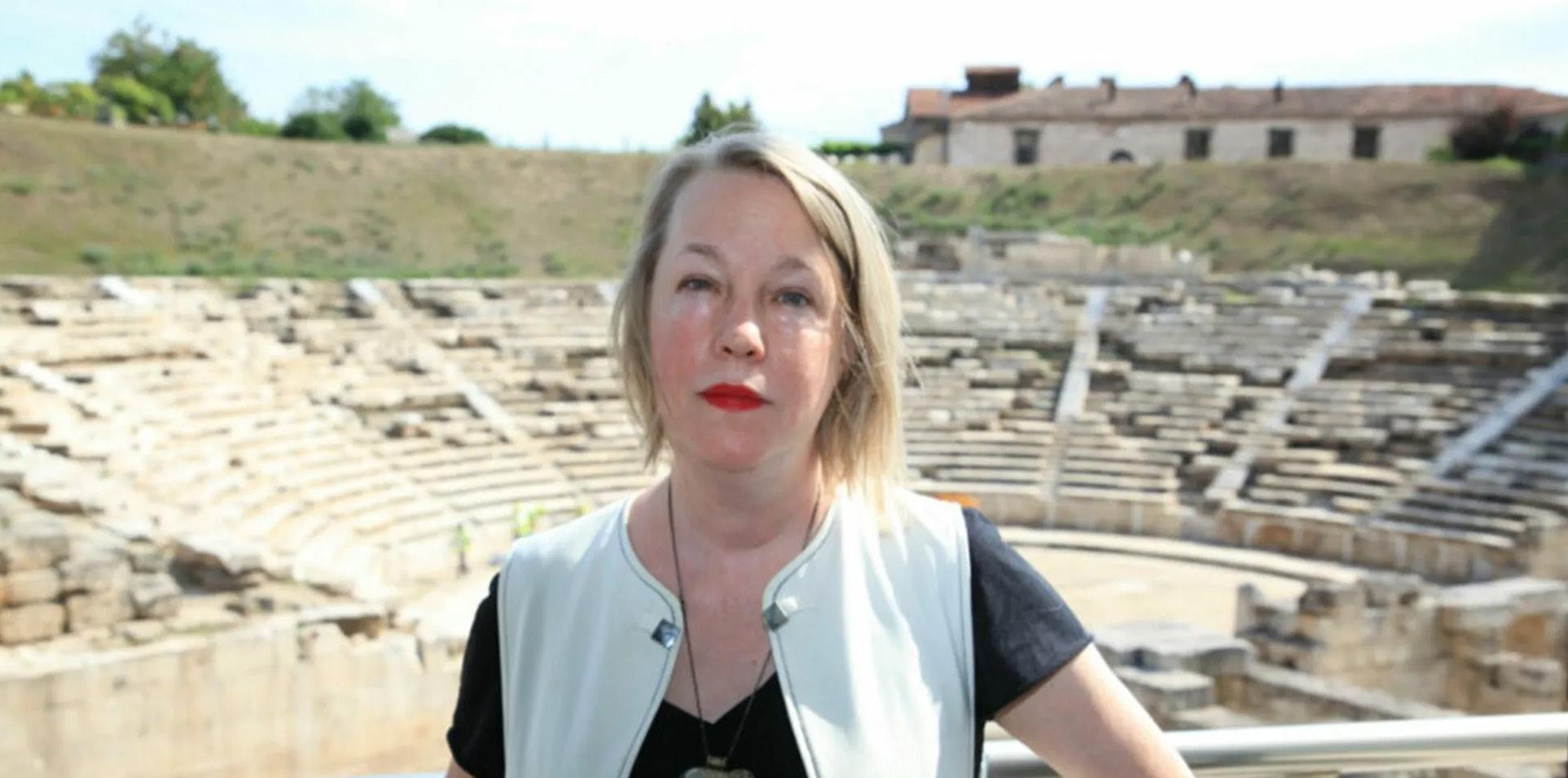
Credit: Kostas Mantziaris
Faith Caswell talks to A.E. Stallings ,
Irecently had the pleasure of sitting down with A.E. Stallings, the current Professor of Poetry. The Professorship of Poetry is an elected position held for four years and remains one of Oxford’s most prestigious posts, since the first appointment in 1708. Some of the best-known Professors of Poetry include Matthew Arnold, C. Day-Lewis, W.H. Auden, Seamus Heaney, Simon Armitage, and most recently, Alice Oswald.
A.E. Stallings is a poet, translator, and Classicist. Her published books of verse include Archaic Smile (1999), Hapax (2006), Olives (2012), Like (2018), and This Afterlife (2022), the last of which brings together a selection of poems from her previous collection as well as some yet unseen poems and translations.
Professor of Poetry “ The poem becomes physically part of the wiring of our brain “ There are many poems that will simply come to me... of the week “ “
Her major translated works include Lucretius’s De Rerum Natura, Hesiod’s Works and Days, and The Battle of the Frogs and the Mice. Professor Stallings has also won numerous awards; the MacArthur Foundation Fellowship, a Guggenheim Fellowship, the Poets’ Prize, and the Willis Barnstone Translation Prize, to name a few.
Professor Stallings’ background in translation has allowed her to play with a uniquely nitty-gritty, nutsand-bolts approach to poetry.
Given this, I wanted to ask her to what extent the poems she reads and writes are alive:
“They’re alive the way a virus is alive ... they’re self-replicating in a sense. They continue to be viral, entangled with life forms as it were. When we memorize the poem, that becomes physically part of the wiring of our brain, and changes how we think, however slightly or majorly, depending on the poem and the brain, and when this happens, I guess. So I do feel that poems are things, they exist, but they also exist as this notation, this written form of the poem. You can think about the way Mozart’s Requiem exists, but it exists in one way when we’re listening to it, and then it exists in time, and it exists in another way as a notation in the score where it’s kind of stored
in the cloud, but the cloud of human knowledge.”
Are there certain poems you’ve memorized which you feel have shifted your thinking or rewired something in your brain?
“There are many poems that will simply come to me. I do
also believe that if you want to memorize poems ... it’s really important, I think, to be moving. It’s much easier to memorize something if you’re walking or swimming or pacing than if you’re sitting down. So I do think it has something
to do also with movement through space as well as time, but there are several poems where the rhythms will just come to me as I’m walking or moving around.” It’s fascinating that movement is attached to memory, that the poem itself kind of needs a body, or something to capture it. “Maybe it’s related to the idea of the memory palace—which, as you might know, is the invention of the Greek poet Simonides—but this idea that our memories kind of construct a physical space that we can move through. So I think the opposite is also true, that if you are moving through a physical space you construct that memory palace easier.” Do you ever have experiences where poems just come to you?
“Very occasionally. You
know, there are poems that I work at very hard and there are poems that arrive pretty complete. I mean that’s always the really special experience, but you’re always preparing the ground for that. That’s the thing, you have to be prepared to receive from the universe sometimes.”
Paraphrasing Randall Jarrell, Professor Stallings then said that one of the best things a writer can do is to stand in the rain and wait for lightning. As she put it: “inspiration is that lightning bolt, but you have to spend a lot of time standing out in the rain waiting for the lightning bolt. Or maybe even standing out in the rain with a
golf club in the air waiting for the lightning bolt, so you have to set yourself up to be in the right place at the right time.”
How do you mediate originality versus tradition in your poems and translations?
“Well, I mean originality comes out of tradition right, so if you think about origins ... a lot of poets have that idea of going back to the spring or source of inspiration, the Hippocrene, as it were. But that very fresh new spring water is coming out of geologic time, isn’t it, it’s coming out of the groundwater, it’s coming out of this artesian pressure of traditions, so I’m not sure
you can be original without grounding in some tradition.
... Often the healthiest thing is to go back more than one generation, look for grandparents and not parents, because you should be rebelling against your parents. ... Often originality is kind of digging deeper into your tradition, but it could also be a very peculiar idiosyncratic tradition.” As one of her projects this year, Professor Stallings has recently begun an exciting new series in the form of a newsletter, called Echolocations: Thoughts on Poems, in which she writes about contemporary poems she particularly admires.
Is that your way of extending your interest in poems that proceed by sound?
“Probably most of the poems that I’m going to be looking at are poems that do something kind of interesting with sound, although I don’t rule out poems that are doing other types of things. I think it’s just a way to do something short form, you know, not a book review or an essay but where I can say, ‘hey this is something cool, I think people should look at it’. It can be hard to find books of contemporary poetry that you instantly like, so I’m hoping it’ll guide people to new work, although I might also look at some older work that maybe
didn’t get a lot of attention. But it’s kind of a selfish thing also, where I get to just explain why I like things, which can be clarifying because sometimes you’re not sure until you put pen to paper as it were. I suppose I might even look at poems that bother me, because I think that those are equally interesting, like, ‘why is this poem under my skin?’”
I would encourage everyone to attend Professor A.E.Stalling’s lectures this year, whether you’re an aspiring writer, avid reader, or merely interested in creativity and craftsmanship. This may be your opportunity to stand in the rain with a golf club.
The Oxford Student sat down with Jens Knoop, the founder of the chocolate drinks chain, Knoops. From opening his first store in East Sussex over a decade ago to expanding over 20 stores, Jens has taken Knoops international and collaborated with the likes of Warner Bros on Willy Wonka. We took a trip down the memory lane to explore how this came about.
Knoop has vivid memories of his childhood, growing up in Germany. After spending a summer day in his grandmother’s garden at the age of 4, he’d step indoors and sit in front of the television watching Sesame Street as he was brought a piece of chocolate. It all felt very ceremonial to him as he would wait to be rewarded by his grandmother with an exciting sweet treat. Although this did not spark an entrepreneurial dream immediately, Knoop knew he would grow to love chocolate. Slightly older, Knoop took to Wales to study photography which was his primary interest at the time. His fondness for Wales pushed Knoop to move out of Germany, but his heart called him to attend Bournemouth University and study conceptual arts. He felt very much at home in
England, bred to be tolerant of the weather, having experienced the harsh winters of Wales.
A short while later, Knoop was headhunted by an American company that sought to gather data from consumer research and was sent all over the world to help them
Knoop in the winter of 2012. As he walked around central London one day trying to get his hands on some hot chocolate, he could not find something nearly as satisfying as he’d hoped for, or something that wasn’t from big coffee chains with low quality hot chocolate. This is when he realised that there was something special to explore here. Knoop explained his concept to a photographer from Rye who jumped on board and saw its potential. And this is how it all began.
best drink for the next customer that would walk in. Naturally, Knoops is taking the world by storm as its first international store opened in Dubai early November. Word traversing continents, the Middle East reached out to Knoop hoping to set up a store in its busy mall where the chocolate haven had built a reputation for itself pre-opening!
himself climbing the learning curve admitting “the more I learned about sustainability, the more I made conscious choices [about] where I’m sourcing from, and I’m still learning.”
“ His fondness for Wales pushed Knoop to move out of Germany “ Students study so hard that they do need a hug in a mug
facilitate this venture. Again, Knoop didn’t make the connection between consumer insights and chocolate that would influence his future just yet but he admitted “wherever I was, whether in Beijing or in Rome, I was intrigued by every consumer wanting to treat him or herself to something that elevates their daily life, that rewards them just like my grandmother rewarded me.”
Turning down an opportunity to move to New York with the end of his corporate era, he found himself wondering where his creativity and passion for the arts would lead him next.
A lightbulb moment struck
Knoop learnt very quickly that there was still a lot to understand when it came to delivering for customers and making commercial business plans. The first store was “a passion driven project” that was built from the ground up. Knoop claimed that he did not have an end goal at first and just made hot chocolate at the store on a daily basis to see where that could take him.
With a background in fine arts, Knoop was inspired to welcome anyone and everyone to discover something unique to themselves. Despite hearing from a lot of customers raving on about how it was going to take over the world, Knoop was more concerned about making the
Evidently, understanding what customers want has proven to be an important tool in Knoops’ armour of success as the queues on Turl Street store seem to never end. When asked about the reward culture his grandma raised him on that Knoop said “Everyone does need that.” Students are studying
So, what is Jens Knoop’s goto order? Knoop claimed that he does not have a particular favourite because, of course, he loves them all! Some of his go-tos are a 54% with double shot espresso, hot or cold. He enjoys something with natural notes of nuttiness or cherry which come from the natural flavouring of the bean. He cannot turn down a 43% hot chocolate as a milk chocolate fan, something he grew up enjoying, much like most of us!
When it comes to his favourite confectionery chocolate, aside from having a soft spot for M&M’s, Knoop revealed that he doesn’t usually buy supermarket chocolate and finds joy in supporting those who also make chocolate independently.
very hard, away from home and other friends, so they do need that little “hug in a mug”. Knoops fits into the Oxford community with its efforts in maintaining sustainability. Knoop found
And finally, clearing up what is arguably the most frequently debated topic, Jens confirmed that it is pronounced kuh-noops and not with a silent K! (although he did admit that he finds all the weird and wonderful pronunciations quite funny).
Week 6
Thurs 21st Nov
Oxford Town Hall



features@oxfordstudent.com | Deputy Editor: Faith Caswell
Section Editors: Sanjana Choudhary, Georgia Fielding, Emma Heagney, Sophie Harrison, Emma Heagney, Cora Partridge, Nayana Juliette Syed, Natasha Tinsley | Columnists: Betsy Fricker, Rohan Kaya

Unless you heeded the advice of doomsday preppers and holed up in a cabin in the woods, you cannot have escaped hearing about the circus of political animals which has taken over the land of the free. One week before the 2024 U.S. presidential election was called, I sat down with Adam Smith, a historian of American politics and the Director of the Rothermere American Institute at Oxford, to take a look at this rollercoaster of an election, the polarisation suffocating the United States, and the almighty battle for the mantle of Trumpism.
This presidential race has truly been “a story of two elec tions,” in Adam’s words, with a clear breaking point after the dramatic withdrawal of Biden on 21st July. While many have argued that a last minute switch out of opponents put the Republican party on the back foot, this start-up cam paign following the psycho drama over Joe Biden certain ly did not do Vice President Harris many favours. Adam argued: “I think it was very much to the Democratic Par ty’s disadvantage. … If Kamala Harris had come through a
contested primary process, she would have had a longer period to establish herself with the electorate.” Harris certainly struggled to make her positions known to voters, to her detriment. As Machiavelli said, politics have no relation to morals; voters are sticking with the devil they know.
“
example of how U.S. political structures manufacture binary divides. As Adam observed: “If you do focus groups with people on even the most difficult touchstone issues, you actually find there are lots of areas of agreement. ... It’s rarely as black and white as it is often presented as being, but the dynamics of partisan competition incentivize political actors in the United States to polarise issues like abortion or gun control.” While the Constitution may not have been
footing the bill for the laundry
list of campaign promises, no one seems to have their wallet out. When the federal budget deficit recently reached a record breaking 1.8 trillion dollars and thwe national debt is nearing 36 trillion, where does the buck stop? As Adam remarked: “It would be hilarious were it not so tragic. You do not have to go back very far in American history to find a time when budget questions were major political issues.
… The United States can obviously get away with this in a way that Britain can’t, and Liz Truss couldn’t. It can run massive budget deficits—just as for the last half century it has run big trade deficits—almost ad infinitum, so long as the dollar remains the world’s reserve currency. As a political historian I would simply say: that will not last forever.
… There will be a reckoning.” Nothing lasts forever, including Trump’s time on the political stage. While it may seem impossible to look beyond four more years of a Trump White House, there will come a time when he departs the scene. What happens next? As Adam noted: “many people would say the Republican Party has essentially ceased to function as a meaningful political party at this point.
unhealthy state” is “completely without precedent”, according to Adam. While figures like Washington, Roosevelt and
“
If you do focus groups with people on even the most difficult touchstone issues, you actually find there are lots of areas of agreement.


No Republican elected official or aspirant for office can afford to be seen as distancing themselves from Trump, literally no matter what he does.”
This “profoundly peculiar and
Reagan had both power and charisma, Adam contended, “none of them could possibly have hollowed out a party institution in the way the Republican party has been under Donald Trump.” As a politcal historian, Adam said that he was rather hesitant to make any speculation about the future.
He agreed that “one way or another there will be an almighty battle among Trump’s acolytes for the mantle of Trumpism."
He questioned, "Who knows if any of them will be able to replicate what Donald Trump has done?” So why should students care about the high-octane drama of U.S. politics? “Frankly, if people just want to stay at home or go to the pub, I don’t blame them for a moment,” Adam concluded. But if personal interest, or perhaps morbid curiosity, has you hooked on the unfolding saga of the American political process, do stop by for one of the Rothermere American Institute's events taking place throughout the term to learn more.
On the 25th October, dog walkers and joggers of South Park were greeted with a large, circus-esque red tent. Oktoberfest had arrived. Located on Headington Hill in East Oxford, it initially felt out of place. After scaling the fifty acres of boggy grass, you are rewarded with a panoramic view of the historic towers and spires of Oxford city centre. With runners sweating and panting their way around the circumference of the park, the big red
tent seemed misplaced. Once arriving at the ticket barrier, however, we were met with a plethora of lederhosen and dirndl-clad people (lederhosen refers to the brown leather breeches traditionally worn by men and dirndl refers to the famous tight-fitting bodice and high-waisted skirt worn customarily by women).
Smoke from the German delicacy of bratwurst cooking on the grill filled the air and the characteristic oom-pah-pah beat of Oompah music floated


IRohan Kaya is doing his Masters in Middle Eastern Studies at Pembroke College.
f students across Oxford were to be polled on their thoughts about recent elections in Georgia, one would likely hear responses about Blue vs. Red, swing states, culture wars, and the inevitable questions about their global impact. Yet the elder Georgia, located in the heart of the Caucasus mountain range, has also seen a recent election that raises similar questions about what the result means for the region as a whole. This week I spoke to Lizi Maisashvili, studying for an MSc in Economics for Development, about her thoughts on her country’s past and present. It is not surprising that the first thing Lizi tells me about Georgia is that “it is the birthplace of wine”, alongside a range of amazing dishes that meat-eaters and vegetarians like her can enjoy. One such example is Khinkali, a kind of
through the flaps of the tent. Oktoberfest is, after all, a German tradition.
Nowadays, Oktoberfest is re nowned for being one of very few places where drinking a li tre of beer from a stein (a large German beer mug) whilst wearing fancy dress is not only acceptable but strong ly encouraged. However, the event has more mod est roots, beginning in the German state of Bavaria in southeast Germany in celebration of the wed ding of Prince Regent Ludwig of Bavaria and Princess Therese of Saxe-Hild burghausen. The wedding of the royal couple took place on the 12th October in 1810 with a celebration that lasted five days. The festivities culminated in a horse race on a meadow in Munich, the capital of Bavaria, with locals dressing in traditional Bavarian costumes and honouring the newly-weds with poems, flowers and other Bavarian produce.
Since the celebration was so well enjoyed by both the royals and the people of Bavaria,

way to Munich) huge red tents and wooden market stalls have popped up in locations all over the world. Blumenau in Brazil, Zinzinnati in Ohio (USA) and Ontario in Canada all host popular derivations of the German tradition.
In the UK, a version of the
dumpling brought to Georgia during the period of Mongol invasions and now a staple of the country, with different regions boasting different variants on how they are made. For anyone who wants to try good Georgian food, she recommends London, which has a large Georgian population and fantastic Georgian restaurants which are unfortunately all too absent in Oxford. Lizi also encourages people to note the uniqueness of the Georgian language and its beautiful script which is used only for Georgian and its sister-languages. The last thing she emphasises is that Georgia, despite being a small country that has often been occupied by external forces, has managed to preserve a lot of its important traditions over thousands of years of history through a resilience that persists today.
Munich Oktoberfest is hosted annually in many key cities, such as Manchester, London, Newcastle, Southampton, Edinburgh and Oxford, to name a few. Although, it is worth noting that these events are much smaller than the original and offer just a glimpse of what the Munich festival promises.
Oxford Oktoberfest, for example, hosted by Barbican Events, provides two types of beer and one type of German sausage for its patrons to taste. In comparison, the Oktoberfest of Munich offers six varieties of beer and a selection of food options ranging from roast chicken, pretzels, gingerbread hearts, weißwurst sausage, salmon rolls and so on, all allowing Oktoberfest visitors to sample well-loved dishes from the Bavarian cuisine. In terms of activities, there’s the option to ... Read the full article on our website.
This raises the topic of Georgia’s recent history; to Lizi, and many others, the most important moment of recent Georgian history was the dissolution of the Soviet Union and Georgia’s burgeoning democratisation process. This is an event Lizi points out has not ended: “we are still in the process of” democratising.
The tumultuous 90s set the stage for the challenges of the new millennium, including a war in 2008 with “one of our neighbours” (though it is not hard to guess who) and last month’s elections, the results of which have been rejected by a huge part of Georgian society due to electoral fraud and voter intimidation by the pro-Russian ‘Georgian Dream’ party.
Lizi explains how Georgia’s need for experts in development economics is what prompted her to pursue that
career in the first place, and pursuing the masters in Oxford would be “applicable to the problems in my country”. She explains how Georgia is a country, like many others, that needs evidence-based research in order to have “efficient policies”, and she hopes to apply the MSc to help Georgia’s development in the near future.
When asked about some of the big differences between living in Georgia and the UK, her answer echoes what endless others say when I ask this; the biggest challenges are the weather and missing food from home. Another big difference is the people. She loves spending time with those in Oxford because of how “interesting and engaging” they can be, yet still misses the opportunity to ...
Read the full article on our website.

The view from OX2
Sophie Harrison reflect on student life at Oxford's outer colleges.
Most Oxford colleges are known for something. Merton is supposedly very academic, Christchurch is rich and tourist central (thanks in part to its Harry Potter filming locations), New is ironically one of the oldest colleges, and then there’s Keble, which, with its layers of red brick, is said to resemble lasagna. There are many other assumptions of varying levels of politeness which I won’t divulge here. As for my own college, St Hugh’s is simply known for being very far away.
Like many college stereotypes, this is part fact, part myth. St Hugh’s is relatively further out, at 0.8 miles from the centre of Oxford. This places it just ahead of St Hilda’s – known for its riverside gardens and position over Magdalen Bridge – which is 0.7 miles away, though in the opposite direction. To the likes of Brasenose students, who practically live on the Radcam doorstep, the distance must seem great. But is it truly as far as it’s made out
to be? And what are the effects of living ‘out here’ with an OX2 postcode, on the academic ‘periphery’?
Near and far
It’s important to preface this discussion by recognising accessibility issues, which can significantly influence perceptions of distance. What seems an easy distance for some may be impractical for others, and colleges should seek to accommodate accessibility needs in the best way
“ What seems an easy distance for some may be impractical for others, and colleges should seek to accommodate accessibility needs in the best way possible.
does not just exist alongside the city of Oxford; it is deeply interwoven with it. This marks a difference from many UK campus universities, such as York or the University of East Anglia (not so coincidentally, where my sisters study/ ied). The UEA campus, for instance, is three miles from Norwich city centre, which suggests that St Hugh’s is only ‘far away’ in the context of Oxford.
It’s also worth noting that not all colleges – including and perhaps especially the central
“ Oxford University does not just exist alongside the city of Oxford; it is deeply interwoven with it.
to Oxford, I’m welcomed by the sign: ‘Welcome to the city of Oxford, a cycling city.’ Cycling is an efficient, eco-friendly way to navigate Oxford, though there can be a risk of theft (a friend from St Hugh’s once had the front wheel of her bike stolen). Strategies like using bike locks help to minimise this risk. Cycling is especially tempting given that it can be difficult to drive around central Oxford and even more difficult to park. Recently, though, I have noticed some members of St Hugh’s JCR page advertising the selling of their bikes, citing the simple reason that they prefer to walk.
possible.
In general, though, I think descriptions of St Hugh’s distant status tend towards the hyperbolic. It feels like an overstatement to deem a jour ney of less than a mile, a walk of just 20 minutes, “so far”. Yet, this is the overwhelming first impression when I tell people I am at Hugh’s. Currently living in Paris for my year abroad, I’m further from Oxford city centre than ever, and this has given me a new perspective. If I lived a 20-minute walk from my ex change university, I’d be jumping for joy. Instead, I com mute into central Paris every day – a city which has had a virtual fitness challenge created in its honour given how much walking its resi dents tend to do.
Perhaps this says something about a privilege sometimes taken for granted at Oxford: the fact that many colleges are right at its heart, their walls and spires merging with the city skyline. Oxford University
ones – offer onsite accommodation for all years of study (which is definitely one of the perks of St Hugh’s). Students may end up living out of central Oxford for a year anyway, whether it’s someone from St Anne’s, already slightly further out, living in Summertown, or someone from Univ living at the North Oxford annexe on Staverton Road.
Almost without exception, I choose to walk into Oxford, even though it takes slightly longer. Most of the time, I listen to music and use the walk as a study break in which to think about something other than French literature or grammar. Sometimes, I wander with no real direction; the relative proximity of St Hugh’s to the University Parks provides the ideal, scenic pretext for this. When I go into town with a friend, we naturally also have longer conversations before we even get to where we’re going.

40-minute walk given its loca tion in South Oxford. Oxford’s public transport is a time-saving solution, though, with buses running late into the night. Each time I return
The experience of living at an outer college gives you more than just physical space – it offers mental space too. When the Oxford bubble comes to feel like too much, it’s reassuring to be able to step slightly outside of it. It’s true that I can’t simply roll out of bed and into the Old Bod, nor can I look out my window onto Oxford’s most beautiful, recognisable architecture, and I definitely have to set off earlier to make it to any socials. But overall I’ve found it peaceful to live in a more distant, lesser-known college. Away from the footfall of the city centre, it feels less touristy and more like home.
Section Editors:
Cici Zhang’s directorial take on Othello was something I’d heard whispers of long before it came to fruition. Needless to say, the promise of table-top tangos in University College’s Great Hall, knife fights, musical interludes and fistfuls of polaroids flung at the audience piqued my curiosity. So, early that day, I’d sat in on one of the cast’s rehearsals to get a sense of what exactly I was going to be in for. They had the Hall from brunch until curtain, and it was difficult to imagine that the space, a sort of hungover Mecca for weekend-warriors in need of a hot meal, would be Venice by 8pm. As the cast began to run their lines, admire their own promotional posters, and the gentle Spanish guitar (played by Imran Omerdeen) picked

up, I watched the remains of half-eaten croissants or full Englishes be cleared away to make room for the massacre to come.
When I did take my seat, the Hall was dimly lit. Its benches were arranged in a long elliptical shape around a central table on which the actors would perform. The back half of the hall was obscured by large partitions, behind which the tech team sat hidden away. When I’d asked Zhang earlier what had prompted her to stage the play in such a novel space, she told me that the Hall “lets us decide where the audience seating goes – it allows us to control and manipulate the distance between audience and performance. The idea is that we seat the audience almost at an uncomfortable closeness”. By the time Act Five rolled around, and I was flinching away from Cassio’s (Lara Machado) knife, I knew exactly what she meant.
As we head into November, the dreaded 5th week blues are accompanied by the usual bugs. Even though I’m off on my year abroad in France, I too have fallen victim to the dreaded winter cold. Everyone has their own ritual for handling sicknesssome swear by bed rest, others slather on vaporub, and a few brave souls insist they’re completely fine (even if their sniffles suggest otherwise).
Coming from a family of doctors, I turn to two things when I’m feeling under the weather: the medicine cabinet and the spice rack. I have little medical evidence to back up my foodbased remedies, but when I woke up unable to breathe and feeling like I’d swallowed sandpaper, I ran (well, hobbled) straight to the shops to whip up some culinary cures. In lieu of Lemsip, I turn to my mum’s ‘Medicine Pani’ (Med-
The play begins with an ominous sort of dance sequence –the lights flash, the cast move strangely, and Othello (Fitzroy Pablo Wickham) and Desdemona (Natasha Hermer) cradle one another gently on the central table. Their chemistry is immediately convincing, impressive given no lines have yet been spoken. All exeunt, and then on staggers Rodrigo (Caitlin McAnespy) in pitiable paroxysms of unrequited love. Zhang’s vision has altered Roderigo a little, from the text’s vaguely irritating incel into a far more sympathetic idiot. McAnespy realises this excellently, offering little adlibbed asides to the audience, and a drunken burlesque to The Kiss of Fire, which she sings herself to wonderful effect.Wickham as Othello was a powerhouse. After murdering Desdemona, he wanders upstage – dialogue is exchanged but I couldn’t look anywhere but at Wickham, alternating
icine Water) - a tea made of green cardamom seeds, fennel seeds, and carom seeds. A cough sweet in liquid form, though much tastier, nothing soothes my throat or clears my head quite like it does.
For one portion, add about 1/2tsp of each spice (make sure to crush the cardamom seeds first) into a saucepan with ~250ml of water. Bring to a boil, then let simmer until the water has picked up a green tinge. Add a small pinch of salt and sugar to taste, then serve.
This time of year is also known as ‘soup season’, and soups are a must-have for when the sickness hits. However, the standard chicken noodle soup does little to entice me out of bed; I prefer to sweat the cold out of me with spiciness. So, my go-to is a hot pot: a classic Chinese dish which involves cooking raw meats, seafood, vegetables, and carbs in a sim-
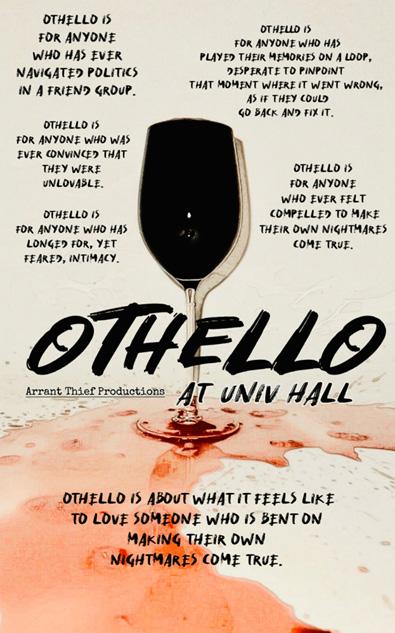
alongside and does a remarkable job of imbuing Desdemona with an actual sense of personality (something the Bard might have forgotten to do.) Her death rattle, when being strangled, is particularly impressive. Within the cast, there were a few issues with line reads, though I would
mering pot of seasoned broth. I first realised its healing powers in second year, when a day spent blowing my nose and essay-writing from bed ended with my friends dragging me to Jin Jin in Cowley for all-youcan-eat hot pot. Two hours later, after spicy broth, tender meats, and piles of vegetables, I felt alive again.
Now, I must confess, my Medicine Pani and hot pot are not as effective as proper medicines. But they still bring their own kind of relief. This is my first time getting ill since moving abroad, and it won’t be my last. It’s tough dealing with sickness in a new place, far from the usual comforts.
Being able to replicate the tea my mum made me throughout my childhood, and reminisce on some of my favourite nights at Oxford, helps just as much as the nasal spray allowing me to breathe clearly for the first time in three days.
challenge anyone in student drama to read thousands of lines perfectly while having to jump on and off a table at least Othello sold out on all nights. This term so far seems to be one of deeply ambitious OUDS undertakings – accordingly, some things go very right, others wrong. I am, however, heartened to see it; the zealous sort of lunacy that powers the very best of Oxford Drama has not died.
Read the full story online at www.oxfordstudent.com
You see, after our first hotpot night in Oxford, it became a tradition. From then on the end of every term was celebrated by a night spent in the back room of Jin Jin, eating, drinking, and laughing to our hearts’ content. Now, hot pot is a remedy of my own - for physical and home-sickness alike.
Here’s how you can create a simple version of hot pot:
Base: Most Asian supermarkets sell premade soup bases. Protein: Thinly sliced lamb, beef, or pork is traditional. Fish or prawns also work well.
Veggies: Leafy greens and mushrooms are ideal.
Carbs: Noodles are great for cooking in the broth, but white rice on the side works just as well.
To prepare, add your soup base to a pot with some water and bring it to a boil. Reduce the heat and cook each ingredient in batches.
Unless you’ve been living under a rock, you’ve probably seen some of the promotion for the upcoming Wicked (2024) movie, an on-screen adaptation of the beloved 2003 musical. The movie is star-studded, with Broadway legend Cynthia Erivo as the main character of Elphaba, the Wicked Witch of the West, alongside pop sensation Ariana Grande as Glinda the Good Witch.
I’m not exactly an expert on the Wicked musical; my only accreditation is that I saw the musical at Broadway’s Gershwin theatre in November of 2018, when I was a whopping 15 years old. Jessica Vosk and Amanda Jane Cooper starred as Elphaba and Glinda respectively, and I remember
being in awe of their talent –so much so that when I heard about the Wicked movie being in production, I was tentatively excited.
I’m not sure what the marketing budget is but it must be insane, because this movie is everywhere. Some of the advertising makes sense, like R.E.M Beauty (Ariana Grande’s make-up brand) selling pink and green pallets, or Mattel’s singing Glinda and Elphaba dolls. However, a lot of the marketing is a little preposterous. For example, Walmart’s Great Value brand created “mystery colour” mac and cheese with the options of putrid green or fleshy pink. EDespite all the marketing for this movie, however, the internet’s general consensus on
the film is mixed at best. The film production has certainly not been without its drama, with Grande’s alleged affair with co-star (now boyfriend) Ethan Slater standing out as particularly shocking for fans, especially considering the fact that they were both married at the start of production. However, the most recent drama surrounding the movie this time revolves around Erivo and her reaction to a fan edit of one of the movie’s posters. A fan of the original musical posted on X (formerly known as Twitter) an edit of the 2024 movie poster that was altered to better match the original broadway playbill. The original post has since been deleted, but the image has already solidified its legacy
across multiple social media platforms and can be easily accessed. A change that immediately jumps out to the viewer is Elphaba’s red lip instead of the green lip that Erivo wears in the official movie poster. The fan additionally photoshopped Erivo’s neutral expression into a smirk and
covered her eyes with the shadow of her hat, capturing the mischievous vibe of the original playbill.
While Erivo’s Elphaba clearly received more alterations, Grande did not escape scot free, either.
Read the full article online at www.oxfordstudent.com
Promotional poster for the upcoming ‘Wicked’ movie

Where will we go together now?” wonders Gwyneth Lewis at the end of her memoir, Nightshade Mother: A Disentangling. One destination on that journey is Oxford. More specifically, Wolfson College, where a crowd of people came to hear Lewis talk about her book and her experiences at a book launch organised by the Oxford Centre for Life-Writing (OCLW).
Being face-to-face with an author discussing and reading her book is a powerful experience. In many ways, it is reminiscent of the oral tradition of epics. The memoir (which relates the emotional abuse Lewis suffered at the hands of her mother whilst growing up) is often filled with haunting pain and scenes of suffering.
Yet, seeing the author calmly and eloquently discussing the tragic passages of both her young and adult life demonstrates the incredible strength with which people can carry on despite their trauma.
The effects of emotional abuse in childhood are lifelong. The constant accumulation of the absence of kindness leads to emotional damage, Lewis commented at the launch, and she spoke candidly about her suicidal thoughts in adulthood, the result of pain suffered as a child. This trauma can often result in physical manifestations. The author explained that those who have suffered from emotional abuse in their childhood are 40% more susceptible to health conditions such as chronic migraines,
of which she has been almost a lifelong victim. This dry statistic became suddenly poignant as she related the blinding pain of the condition, which almost made her feel like impaling her eye with a sharp object. Writing about her painful childhood memories was not easy, but Lewis told the audience why it was necessary: it helped her deal with the latent effects of the abuse, allowing her to essentially ‘write herself’ out of a crisis. The “disentangling” she refers to in her memoir’s title is an apt name for a process that involves going back over old memories, often expressed in the pages of youthful diaries. The threads she must pull apart in many ways are the different voices which run throughout the memoir.
Alongside Gwyneth Lewis, we hear her younger selves, her mother, her father, and a toy monkey named Mwnci, a souvenir of childhood who offers another perspective on her life. On the stage at Wolfson College, she pulled out this toy, which had travelled far both in distance and in time, to speak to the audience. This moment brought the audience closer to her story, making us recognize the richness of the tapestry she has woven of the threads of memory. Lewis is careful to tell us that she is not putting her mother on trial, noting some of the more positive moments she shared with her including hugging whenever she saw her after her father’s death. At the same time, however, she is clear that she cannot forgive
her mother for what she did; instead, she must “unforgive” her, because her mother never acknowledged the damage she caused.
“I’m unbiddable,” she concludes, “and am going to be a formidable old woman.” Looking at her on the stage, we see that she is already “formidable”.

ward Brown
Oxford Victorian Christmas Market – live music, artisan traders and festive food and drink.
Broad Street
Thursday 14th November
- Sunday 17th November, 10am - 5pm
Write Cut Rewrite - a peek behind the scenes and talk with the curators of this exhibition, available in person and online. Free but booking required, tickets available online at visit. bodleian.ox.ac.uk/.
Online or Weston Library, Sir Victor Blank Lecture Theatre
Tuesday 19th November, 1pm
A Night at the Opera by Candlelight, performed by London Concertante. Tickets from £32.13, available online from londonconcertante.com/.
Christ Church Cathedral Thursday 21st November, 8pm
Unnatural Histories tour of the Oxford Museum of Natural History by Uncomfortable Oxford. Tickets from £5, available online from www.oumnh. ox.ac.uk/.
Oxford Museum of Natural History
Saturday 23rd November, 10.30am
Richard Ovenden in conversation with Elif Shafak. Tickets from £5, available online from visit.bodleian. ox.ac.uk/.
Blackwell Hall, Weston Library
Tuesday 26th November, 5.30pm
Dear Evan Hansen at the New Theatre, Oxford. Tickets from £28, available online from www.atgtickets. com/.
New Theatre, George Street
Tuesday 26th - Saturday 30th November, 19.30pm, additional performances Wednesday and Saturday, 2.30pm
Sophie Harrison is a Culture contributing editor at the OxStu.
Through the social media grapevine, news has emerged of not one but at least two upcoming remakes of Jane Austen’s beloved Pride and Prejudice. Given that the 2005 adaptation starring Keira Knightley is one of my favourite films, this prospect fills me with both excitement and trepidation. Why recreate what is already a triumph? What new perspectives can be offered?
Jane Austen has been adapted many times over the years. Among the best-loved screen adaptations is the 1995 film Sense and Sensibility, which brings together a star-studded ensemble: no less than Emma Thompson, Alan Rickman, Hugh Grant, and Kate Winslet. As for Pride and Prejudice, fans tend to be divided between two versions: the 1995
BBC series and the 2005 film. Contrary to the tendency to pit them against one another (who played Darcy better: Colin Firth or Matthew Macfadyen?), I actually really appreciate both.
The six-part series is certainly more faithful to the novel, but the 2005 film’s creative licence is what makes it so beautiful. Without it, we would never have had the iconic ‘hand flex’ scene, nor the rainy proposal, in which Austen’s “You must allow me to tell you how ardently I admire and love you,” transforms into the more succinct “I love you. Most ardently.” Not to mention the incredible soundtrack that brought us “Dawn”. Firth may deliver the best look of love, but Macfadyen interprets Darcy’s shy awkwardness to perfection. Both characters bring a new light to the character, and one does not have to take away from the other. But do we really need yet another Darcy?

The BBC and Netflix are the rival TV forces behind the new adaptations. Dolly Alderton, author of Everything I Know About Love, will produce Netflix’s script, with Normal People’s Daisy Edgar Jones among the names rumoured to be Elizabeth Bennet.
In contrast, the BBC will draw less on Austen’s text, turning instead to Janice Hadlow’s The Other Bennet Sister. I read Hadlow’s spinoff book after a recommendation from my A Level English Lit teacher. It imagines the untold story of Mary Bennet, the bookish, musical and supposedly ‘plain’ sister (what will Hollywood do with such a casting description, I wonder?). While longer than it probably needed to be, the book has potential – an ‘unconventional’ heroine undergoing a journey of self-discovery, an endearing love interest (or two), and sublime Lake District scenery. Naturally, the dual adapta-
tions may stir competition between the BBC and Netflix. At first glance, the BBC’s approach, which aims to fill a gap in the original tale, seems more innovative. Writers often ‘respond’ to canonical texts in this way, as in other Pride and Prejudice-related books like Longbourn (the story of the ‘below stairs’ domestic staff at the Bennet family estate) and What Kitty Did Next. We might expect Netflix to follow the mould of its enormously popular period romance, Bridgerton. The 2005 film Pride and Prejudice may be romantic, but it achieves this without so much as a kiss (if we put aside the alternative US ending, the existence of which slightly baffles me). It also arguably remains fixed within the period drama model of its time, which tended to exclude BAME talent. Will Netflix aim for both a steamier and more diverse product?
Kitty Fisher, 2nd year English student, bares all about collegiate fashion
Christ help Christchurch
Listen, I’m really not trying to ruffle any feathers here, but by the looks of it - no one’s even got any feathers to ruffle.
In the whole of Christchurch you won’t find a sequin, a stud or even a frill:, the fashion there is criminally dull.
Despite having had Lewis Carroll wafting through their honey-coloured halls, Christchurch is no vogue Wonderland. In fact, it’s more the rabbit hole where fashion goes to die. Often, you’ll witness droves of boys schoffeling past the famous Bullingdon Club steps, unapologetically flaunting their Tattersall shirts
and loafers on their way to get dribbling at Chundy Bar. Even the tourists there are painfully predictable. The whole place is cloaked in Harry Potter capes tied around the necks of superfans with selfie sticks stuck on their magic wands.
So if you’re visiting ‘The House’, be prepared to get papped. Even as I was rifling through those business casual, muted tones of one student’s wardrobe, I whipped around to see an entire family with their lenses and noses pressed up against her bedroom window.
But aside from the exasperating amount of backless silk crumb catchers and kitten heels clopping past, Christchurch isn’t completely unoriginal. Its redeeming qual-
ities are its rambunctious ginger population and the college craze for low-rise velour trackies with CH bedazzled on each cheek.
“ Christchurch is horrifically unfashionable, uniquely so
So, unless you’re looking to be Lindsay Lohan, I think I’d give Christchurch a swerve.
The Cult of Magdalen
Much like their soon to be unveiled historical archives, the students at Magdalen stay undercover, hidden away beyond the city wall. It’s rare, but if you want to spot one in
the wild, they can often be distinguished by their fur… hats, that is. A Magdalen student’s defining accessory is a shaggy trapper hat yanked right down over the eyebrows, cloaking their ears to shroud the features buried within.
This is because once you’re inside the college, the climate drops down to sub-zero, a safety measure used to ward off imposters. Biting winds whistle through those echoing stone corridors and nip at the ankles of any trespasser. Cautiously, I observed one boy swaddled in a goose-down Shackleton puffer jacket, complete with storm cuffs. He was lacing up his rugged, fullgrain leather walking boots ready to embark on the expedition from the library to the OKB (Old Kitchen Bar).
Avin Houro interviews artist Krikor Momdjian at his exhibition, featuring his
Trying to reach a real equilibrium. That is the challenge. This is the dynamic,” Krikor Momdjian tells me, as we gazed across his latest exhibition, pulsating radiance throughout the sterile-white of the Pembroke Art Fund Gallery.
Adorning the walls of Pembroke College’s very own white cube lays ‘Life Map of a Wanderer - Transcultural Relations,’ the latest exhibition of multimedia artist and poet Krikor Momdjian (1947).
Momdjian, who is ethnically Armenian, was born in Lebanon in 1947 and was raised in Beirut. He spent much of his teenage years as a pupil of the Seminary of the Armenian Monastery St James in Jerusalem, before returning to Lebanon to study Fine Arts. Having received a scholarship to spend three years studying abroad, he chose to go to Florence for a year, before continuing his studies further in Paris until 1976. Since 1979, he has resided in the Netherlands, where much of his work is produced.
It is this very international history which shapes Momdjian’s work. With so many cultural influences— ethnic and national backgrounds spanning Armenian, Lebanese, and Dutch— along with previous residencies in Jerusalem, Florence, and Paris— themes of diaspora, memory, and cultural identity naturally seep into his art.
‘Life Map of a Wanderer’ performs a quasi-retrospective role: the exhibition covers six different series of works, tracking Momdjian’s artistic development over five decades. Curated by himself, Momdjian uses the gallery to produce a visually abstract catalogue of his experiences and cultural exchanges, creating a rich dialogue between
each of his pieces, as they converse in his personal history and collective memory.
Perhaps the most exciting part of the exhibition is the 14 large rectangular paintings neatly stitched across the majority of the gallery, for his series Transcultural Relations (2022-2024). With this exhibition being the first time the pieces have been hung together in unison, together their kaleidoscopic palette engulfs the room.
“ And now look at Lebanon, which gave me life and helped my parents survive
But behind this is more remarkably an experimentation with numbers, form, and colour which transforms the way we understand Momdjian and his art. Each oil painting contains a number, which as Momdjian tells me, tracks his journey through temporal, physical, spiritual and psychological realms.
For instance, the exhibition aptly starts at Transcultural Relations (0) - (Cosmological), with its central circular form— whether a planet, womb or a seed— clearly illustrating notes of ‘origin’. Its background also notably initiates the Transcultural Relations series, proclaiming the colour arrangement that will mark the rhythm of the visual expedition ahead.
To its right, the journey begins in Armenia with Transcultural Relations I - (Armenia). To Momdjian, Armenia is “where paradise is.” Through pomegranates at the forefront, and silhouettes of mountains in the background, abstract
Armenian symbols stream throughout the bright centre of this piece. And yet these notions of beauty are enveloped by its dark and ominous bordered surroundings. “I was not satisfied, life has changed around me. I was not happy with what’s happening in our world.” Momdjian reveals visually how Armenia’s century long endurance of waves of trauma, from genocide to geopolitical conflict, permeates the vibrant sacredness of his homeland.
Such encroaching shadows of historical, and present, wounds are further reflected in Transcultural Relations VI - (Jerusalem, Why?), in which the words “Jerusalem why so much pain and miseries?” are boldly inscribed. “I was [in Jerusalem] in 1964, exactly 60 years ago, and I had the same questions,” Momdjian recounts, “there was also war at that time. It didn’t change, it’s worse. And now look at Lebanon, which gave me life and helped my parents survive.”
He has chosen to place Transcultural Relations VI opposite the gallery entrance, so that viewers are immediately confronted with the inescapable reality of ongoing mass violence. When I asked Momdjian if he sees himself as a political artist he adamantly asserted “no!” He tells me instead that his concerns lie with the agony faced by millions of innocent people.
As Transcultural Relations unfolds, each of Momdjian’s global residencies is visually reviewed. While each canvas is strikingly distinct, they are unified through a shared precise palette, with certain colours threading the series together. For Momdjian, this “consistency didn’t come just like that.” Instead, “it is an accumulation of my experience with life and how I feel. When
I’m sure of something the painting comes itself. It’s with its own life.”
Over the years, Momdjian has developed a language of colour to express his emotional landscape within each place he’s occupied. To him, “yellow is life, the dynamic; green is nature; red represents beginnings, through blood and energy; violet is the mystical, religious belief, the cosmos; and blue is the sky.”
But later on, he also tells me “the red/orange is the Netherlands; yellow is Lebanon; green is Florence; blue is Paris; and violet is Jerusalem, which is mystical.” Each season is also assigned a colour. It’s clear that his use of colour is both fixed and flexible, permitting Momdjian to adapt its varying meanings
“ He adamantly asserts he is not a ‘political’ artist
across place and experience. Fortunately, Momdjian’s eruptive use of shape provides a framework in which to understand this. This is evident when comparing Transcultural Relations II - (Netherlands) and Transcultural Relations III - (Lebanon). The arranged overlapping and rigidly adjoining blocks in II are to Momdjian the “Dutch men-
tality of everything,” which he would have adopted when living in the Netherlands.
In contrast, he tells me the more fluid and cross-cutting III depicts how Lebanon is “in a totally other way. It is more dynamic.” The harmonious layers of depth of colour and shapes in each Transcultural Relations painting therefore present a portal to Momdjian’s lived experience in each country.
Transcultural Relations VII to X also covers West to South, a broader reflection of Momdjian’s thoughts and feelings towards different axes of the globe. Where Transcultural Relations VII - (West) represents Momdjian’s cosmological experience with the West, Transcultural Relations VIII - (East) demonstrates a more spiritual feeling towards the East. However, the depiction of this spirituality is of notable significance for the rest of the exhibition.
His work not only enriches viewers’ understanding of the diasporic journey, but also contributes to contemporary art a language for negotiating multiple identities, challenging us to rethink how we relate to place, culture, spirituality, and each other in a fractured yet interconnected world.
‘Life Map of a WandererTranscultural Relations’ will be exhibited until 17 November 2024.




As a postgraduate student who doesn’t live in college, it is hard not to feel left out of the college community. It’s common knowledge that the forty-three colleges of Oxford University are an essential part of the university experience. For undergraduates, they are your homes, your social spaces and often your classrooms. As a postgraduate, colleges play a slightly different role: faculty departments and libraries tend to be where you will find us the majority of the time. That being said, colleges still provide a home and a community for many postgraduate students, whether they be master’s students or PhD candidates. In fact, I was originally surprised to learn that even teaching staff often take up residence in college. Despite the fact that living in college seems to be a normal and expected aspect of Oxford university life, especially for new
students, I alternatively chose to live out.
Although Magdalen’s alluring mix of Gothic and Neo-Classical buildings with their grandiose towers and spires promised to fulfil all my childhood dreams of romanticised academia, I decided to swap out the historical architecture for a brick studio-flat in South-East Oxford. Of course, I would be lying if
“ They are your homes, your social spaces, and your classrooms
I said I hadn’t fantasised about wandering leisurely through the sprawling luscious green gardens of Wadham or Merton, imagining myself as Lewis Caroll’s Alice in Wonderland amongst
identity@oxfordstudent.com | Deputy Editor: Sami Jalil Section Editors: Willow Lock, Lucy Pollock | Columnists: Sharon Chau, Will McCaffery
hadn’t expected the student world to coincide with the (real) working adult one so much.
Upon reflection, I see now that my own life is a microcosm of this interaction between university and, well, life that exists after it. Living out of college allows me to live with my partner, who is no longer a student, and who works a full-time job. Their alarm regularly wakes me up at six in the morning and our evening conversations often revolve around organising the next shopping list, planning dinners in advance or figuring out who can clean what part of the flat and when.
talking flowers and smiling cats. But alas, the garden I walk through to exit my flat complex is not only small and shared between forty or so flats but is also littered with toddler-sized tricycles, bikes and various other plastic children’s toys. My neighbours are not fellow university students who come home late on a Friday or who have house parties with loud music until three in the morning but are instead families with young children and jobs. As I work at the dining room table, I observe from the living room window a routine backward and forward flow of mothers and fathers with prams, dropping their children off at school and then later picking them up. Having come from the University of St Andrews, where students account for an impressive thirty one percent of the town’s population, I
My experience of my own college is limited but, basing my judgements off the MCR group chat I have found myself in, I am living a very distinct life from the majority of my fellow postgraduate students. “Anyone want to grab dinner in the dining hall?”, “Can I borrow a hairdryer from someone?”, “Anyone fancy a walk in the park in five minutes?” are all requests I have no choice but to decline. I live a thirty-minute walk from my college, or a two-bus journey which, weirdly, still takes around half an hour to arrive. Short notice, last minute events are practically impossible for me to partake in. What is more inconvenient is that my college isn’t located in town, so while some of my classmates who don’t live in college can pop-in for a warm lunch or a sit-down in their MCR, I am restricted to the libraries and their common rooms.
Do I feel like I’m missing out? Sometimes, yes. When I do get the chance to go to the odd event in college, I see how people have already formed close groups of friends and are already sharing inside jokes and gossiping about who slams the doors too loudly or who spent too long in the shower at a peak time in the morning.
But in all honesty, these snippets of overheard conversations bring back memories of my years in halls as an undergraduate student. Sharing kitchens and bathrooms with strangers you have had no choice in living with is not always fun, especially when they have different levels of cleanliness or want to use the hob at exactly the same time as yourself. Furthermore, when I return home after spending the day between the libraries and my classes, I am able to disconnect myself from my student life and immerse myself in my graduate, adult one. Whether I understand complicated theories or know the meaning of a plethora of Greek symbols suddenly isn’t as stressful. Having a physical distance between my places of study and my home has improved my mental health and wellbeing in more ways
“ I am living a very distinct life from the majority of my fellow students
than I can say. It goes without saying that I consider my time here at Oxford to be incredibly precious but I am also pleased to have finally found a balance between study and my personal life.
Undoubtedly, there are elements of college life that I would have loved to have experienced and as the semester gets underway and the people around me grow fonder of their colleges, a sense of disconnect sometimes washes over me, a sense of being out of sight and perhaps a little out of mind. That being said, it only takes cooking a peaceful dinner in my private kitchen to realise that choosing to live out of college was, at least for now, the right decision.

FWill McCaffery is a third year Law student at University College.
uck, I don’t want to go back to America. There is no part of my identity that is not political. I am an American. I am queer. I am a man. I am a leftist. I’m a goddamn communist. I feel like every part of this will be weaponized against me (except perhaps the man bit). But I also feel like I have to go back—there’s so much work to do, and people I care about. So let’s talk about it.
To the British:
First, this will absolutely affect you. Trump will likely pull out of NATO, cut off helpful trade deals with the UK and EU, harm friendly relationships and common foreign goals. You have every right to be worried or concerned about this. And secondly, you have every right to be mad because of these harms, and direct it at Americans who supported Trump (omg please do, if you find them please let them know how you feel).
But please, for the love of god, understand: I know and recognize America will and has done so much harm to so many places in the world, and our business is the world’s business, but it will be our families, not England’s families harmed. It will be our communities stripped of rights, our towns impoverished, our citizens brutalized. No American deserves this, no matter who they voted for and no matter how many Americans voted for it. Please do not tell us we “made our choice” or “you knew what you voted for.” We did not, and no matter what, no one deserves the harm that Trump will bring. What I will say is most Americans I know, at least the politically engaged ones, are quite worried about this, and it’s extremely isolating to be in a country of people not going through this same grieving—and even more
so in a city of what could be called, kindly, developing academics and, cynically, wannabe pseudo-intellectual know-it-alls. So what I am saying is let’s not be that; be there emotionally for your American friends, don’t diminish or dismiss or blame, validate and listen. And while we’re at it, if y’all could start pronouncing your r’s, I would greatly appreciate it.
*If you are from anywhere America has brutalized, colonized, or invaded, this ain’t for you—please say whatever you want. Actually, this is for you: please, let’s hate on the British together.
To the Americans:
Real talk: it’s scary. Trump won, and god, I don’t want to sound like a whining liberal, but this man is gonna fuck shit up.
I don’t wanna do a piece on why I think Kamala lost (she failed the working class and did not give any real solutions) or a rhetoric piece on why Trump will be so bad (literally everyone except conservative straight white men will have their rights stripped away and he will decimate parts of the global south). But I more want to speak on what I know and what we can do about it, while recognizing full well I am not the central case for who Trump’s fascistic goons will target.
I don’t think he’ll be a fascist like fascists were in the past. I don’t think it’ll look like internment camps or death squads. Even though America is clearly not above those things—ask anyone about Nicaragua and the CIA shivers. But I think it’ll look a lot like it basically already does. Under Reagan, it looked like gay men dying on the street of AIDS, no one helping them, today, women dying ...
Why I decide to use a pen name...
Benji Chowdhary discusses using a pen name to protect personal safety.
Writing under a pen name is one of the most bizarre and conflicting things I’ve ever experienced. I know some of my closest friends might be reading this and have no idea it’s me behind it all: part of me feels thrilled and liberated, hiding comfortably in the shadows, and another part of me feels quite sad that I can’t publish my writing openly on topics that really matter to me.
“
Did you know that Lewis Carol, George Orwell and Maya Angelou are all pen names? One of my favourites is the Bronte sisters who had to initially publish their work
under male names due to the constraints of the 19th-century gender conventions.
“
It’s quite interesting to read about the various reasons for pen names: sometimes it’s just simply for a bit of privacy or to protect anyone involved, and other times you’re that 19th-century woman who is literally not allowed to publish her work without a mask. You don’t really question the name of an au thor at the end of an article, but I would like to think that the thought of who I am may
have crossed your mind even briefly.
Long story short, I write under a pen name for my own


self: but even then, I find myself over-analysing each word to see if someone could decipher my code and see straight through to the “real” me. Pen names give you this veil that really makes you write differently. I write in fear of someone somehow connecting the dots and outing me to the wrong people, but I also write in the joy of knowing that people out there are hearing my voice- even if they don’t know it. I think that’s enough for me: I’ve never been a particularly extroverted person, so I’m quite happy for people to enjoy (or hate) my writing without putting a name to a face.

Pen names give you this veil that makes you write differently
I see writing as an art, and my general approach to art of all kinds is to put my heart on

the page and let the audience create their own personal meaning. I offer you a window into my soul and my life on this page: do with it whatever you desire.
Regarding the actual name, it isn’t just some made-up joke or pun so that I can say whatever I want with no repercussions (which sometimes is the purpose of pen names). It took me quite a while to decide on a name I was comfortable with - one that still captured my identity without being too blatantly obvious. There are so many layers to my pen name and the writing I’ve published under it, and I quite like being able to keep that little secret to myself.
I have a lot of writing and art that I would really like to properly publish someday, but the risk of someone finding out it’s me is something I’m not ready to tackle. Every time I write, I wonder if it’s worth putting my life on the line to let people hear my voice. I’ve considered every possibility and the conse-
Despite all the talk about election results taking days, even weeks to determine, it was already clear which way the election was swinging a few hours after polls closed. It became increasingly evident that Kamala Harris was set to lose all seven swing states. The final electoral college results were a crushing defeat — Donald Trump’s 312 to Harris’ 226. Biden won 306 back in 2020.
One of the most surprising parts of the landslide Trump victory was how little abortion rights ended up affecting the presidential race. Abortion was projected to be one of the key winning issues for the Democrats. With the latest research showing that 63% of Americans say abortion should be legal in all or most cases, and Trump famously taking credit for the Supreme Court’s reversal of Roe v. Wade in June 2022, Democrats were hopeful that the issue of abortion access would swing the election in their direction. Harris made
quences of people finding out about each layer of my life, and I can’t tell whether it’s the catastrophic anxiety talking or if it really would be that drastic for me to just come out as myself.
“
This double life that I lead expands far beyond my pen name
This double life that I lead expands far be yond my pen name, and it’s exhausting. I am constant ly adjusting this elaborate mask I wear based on the people I encounter on a day-to-day ba sis: it’s a rather tricky combination of neu rodivergent mask ing, people-pleas ing, social anxiety and quite simply
not feeling safe to come out.
I so desperately want people to know who I am, but I don’t know if I’m ready for that. “Better to be hated for what you are than loved for what you’re not”: this is what I aspire to be. I aspire to be my authentic self without caring what other people think. I aspire to be free, but that seems like the most diffi
thing I could ever try to do. Maybe one day I’ll come out. Maybe I’ll hide in the
“ The risk of someone finding out it is me is not something I’m ready to tackle

abortion rights a focal point of her campaign, and explicitly called abortion restrictions “Trump abortion bans”. The Democrats were right that most voters supported abortion, with seven states, including Missouri, Colorado, and Montana, voting to protect the right. However, they did not expect the split-ticket voting — where voters vote for candidates from different political parties in the same election — that ended up happening. Most of those who voted “yes” on abortion-related measures in Arizona and Nevada also voted for Harris, but about a quarter of these voters backed Donald Trump. One stark example is the voting choices of Republican women in Nevada, where a third voted for the right to abortion, but only 5% supported Harris. Why did this happen? One possible explanation is just that there were more important issues that voters cared about. A CBS exit poll showed that among those in Nevada who voted for Trump but also
to expand abortion access, more than half said that the economy was the most important issue. With high inflation and a persistent cost of living crisis, it is no wonder that the anti-incumbent candidate had an advantage. Nate Silver, who rose to fame after his FiveThirtyEight was the closest to predicting a shock Trump win in 2016, tweeted that “each additional $100 of inflation in a state since January 2021 predicts a further 1.6 swing against Harris”. The salience of economic issues thus overshadowed the salience of abortion rights. Another explanation is that voters did indeed support abortion access, but disagreed that Trump was anti-abortion. In the presidential debate, Harris accused Trump of planning to authorise a national ban on abortion if he were to be re-elected, and consistently repeated this claim during her campaign. Trump vehemently denied this, saying that the decision should be left up to individual states. Ultimately,
shadows forever. Or maybe there’s some sort of middle ground in store for me. But for now, I’m quite happy as Benji Chowdhury, and I will continue writing about all these aspects of my identity in the hopes that regardless of where my life takes me, someone will know who I am in some way. Freedom is a gift I hope to give myself one day, and I hope it is a gift you can give yourself too.
Trump was more convincing to the electorate. Harris’ campaign argument that Trump would try to put a national abortion ban in place failed to resonate with most voters outside the Democratic Party. It is also possible that the ability to vote on abortion-related measures, including Proposition 139 in Arizona and Question 6 in Nevada, paradoxically led to decreased support for Harris. If voters felt that they could protect their right to abortion by directly voting on the issue itself, they may have less incentive to vote for Harris. In the end, focusing this election on abortion rights was a gamble that the Democrats and Harris lost. It was an issue that many Americans cared about a lot, but not enough to sway them away from Trump. Perhaps the big takeaway here is that the left ought to place heavier emphasis on economic and labour issues ...
Read the full article online at www.oxfordstudent.com
science@oxfordstudent.com
Semaglutide, branded as Ozempic, has recently sparked a media storm of public interest, misinformation and discourse. Ozempic has become trendy amid the resurgence of 2000’s beauty trends, with the BBL body being out and “cocaine Kate” being in. Could the use of Ozempic for weight loss be the solution to a global health crisis, or a quick-fix to an underlying epidemic?
Without boring you with the science, Ozempic essentially works by mimicking the effects of the naturally produced hormone Glucagon-like peptide-1 (GLP-1), binding to their receptors. This stimulates the pancreas to secrete insulin and suppress the glucagon secretion, decreasing the overall sugar content of the blood. Also, Ozempic delays gastric emptying, extending the feeling of fullness
by increasing the retention of faeces. Although the exact mechanisms of Ozempic on the brain remain unclear, Ozempic does act upon receptors in the brain to suppress appetite.
Ozempic can help induce significant weight loss, improving quality of life and decreasing the risk of associated secondary diseases such as cardiovascular disease. Also, Ozempic can help decentre food and for those with a food addiction, this can be a crucial step in breaking the cycle of overconsumption.
As ozempic is a self-adminis-
tered injection, it is vulnerable to misuse, overuse and abuse. Ozempic was originally manufactured as a diabetes drug, and its growing off-label use for weight loss is indicative of wider cultural issues. It reflects the recent commercial medicalisation of beauty, where ideals such as thinness have been monetised. As weight loss drugs become more accessible, individuals without a medical need may seek out these drugs to attain these standards. Therefore, Ozempic will perpetuate and reinforce the standards that the body positivity movement has been working to dismantle. The rise of weight loss drugs has exposed the shortfalls of the body positivity movement, working to dismantle the ideology that being able-bodied & thin is synonymous with being healthy. Despite efforts to promote self-acceptance, the
Editor: Amelia Bryan Section Editors: JJ Fitzpatrick, Nicola Kalita, Yunzhang Liang, Mominah Ramzan Syringe and tape. Credit: Pexels.com

rise of these medications has shown how deep rooted societal beauty standards are. Undoubtedly, the movement has normalised seeing a diverse range of bodies, particularly online, however, the rising demand for Ozempic has proven that, despite these efforts, society still prefers slimness.
Like many, I remain torn about the effect of drugs like Ozempic. As a medical student, I can see the value in
curbing the obesity epidemic that is spreading throughout the west. However, as a young woman I feel conflicted about the role of these drugs in reinforcing harmful and unattainable beauty standards. From the Aphrodite body in ancient Greece to the Gibson Girl of the early 20th century, the ideal form has shifted based on a ...
Read the full story online at www.oxfordstudent.com
years post-Covid: How the pandemic
Mominah Ramzan
COVID-19: masks, social distancing, and weekly clap for carers. A shocking event few saw coming, the pandemic now feels like a distant memory, as we approach the fiveyear anniversary of the first case in Wuhan. Yet, while masks and isolation are no longer dai ly routines, COVID’s im pact on soci ety remains profound. Beyond cio-economic shifts, it left
a lasting mark on scientific research, transforming the speed and collaboration within the scientific community in ways that continue to shape its future.

discusses how covid has changed science “ ... exposed the shortfalls of the body positivity movement “ Most striking change is the rise in scientific knowledge
Prior to the pandemic, the average length to design and deliver a vaccine was 1015 years. From research to clinical trials, regulation and funding, it’s no surprise that developing a vaccine can be painstakingly intense. However, unprecedentedly, during 2020, more
than 90 vaccines were being developed across the globe; only a month after scientists declared COVID-19 as a global pandemic. The urgency spurred unparalleled speeds in vaccine development, breaking through barriers that previously took years to overcome.
Despite the large-scale international effort, creating a vaccine in under a year is not easy. A key breakthrough revolutionising the process was mRNA vaccines, which had previously never passed clinical trials. mRNA is a single-stranded molecule which contains information to encode for proteins – in other
words, it’s vital for our cells to function. Though discovered in the 1960’s, with decades of
subsequent research to follow, it wasn’t until Pfizer’s COVID-19 vaccine that the first mRNA vaccine received full approval by the FDA in the US. These vaccines are swift and adaptable in responding to new infections, thus a sig-
nificant step forward in the future of vaccine development. One of the most striking changes in the past five years is the rise in public scientific knowledge. Before 2020, most people claimed their biological knowledge didn’t far exceed GCSE content, yet a few months into the pandemic, terms like PCR tests, spike proteins, and R number became widely understood. For the first time, mainstream news coverage was heavily influenced by scientific research, providing an active reason to stay updated. Pressure increased on scientists to make science accessible, for it was the general
public whose lives were being affected. Projects including ‘The Vaccine Confidence project’ were aimed to halt misinformation spreading and address vaccine hesitancy.
Similarly, research postCOVID has demonstrated an increase in scientific trust
since. A survey of over 2000 British adults con cluded that “trust in genetics is high and went up significantly during the pandemic”. There is a growing public in terest in understand ing research advancements

that impact daily lives, driven by the hopes of preventing another pandemic.
A major shift seen recently has been the increased funding priorities towards research and development and the pharmaceuti-
COP16: Is it the
cal industry. Many firms and investors are more inclined to support projects with clear public health implications, while governments have dedicated budgets set to support existing, underfunded projects.
Reflecting on the near five year anniversary, it’s clear the
Amelia Bryan discusses whether COP16 was a success

On 2nd November 2024 in Cali, Columbia, COP16 was suspended without many agreements being reached on a global fund for nature, biodiversity targets and other issues. With ongoing conferences designed to facilitate the protection of nature, it is worth looking at whether these conferences are driving sufficient progress on biodiversity.
COP16 is the sixteenth Conference of the Parties to the Convention on Biological Diversity (CBD). The CBD is an international agreement pertaining to issues surrounding biodiversity and the environment. It was negotiated in 1992, with 168 nations signing the agreement. Only two countries are not parties to the convention; the United States and the Vatican. The CBD centred around three main objectives: the conservation of biological diversity, the sustainable
use of biological diversity and the equitable use of benefits arising from the utilisation of genetic resources. Conferences occur every two years to discuss the development of current agreements and to further advance policy.
These conferences have become more vital than ever to the state of biodiversity and the wider environment. As we continue on our path of fossil fuel use we continue to drive the decline of nature.
The living planet report for 2024, published by the WWF, shows the striking peril na ture is in. They found that the average size of moni tored wildlife populations shrunk by 73% in the last 50 years .The report notes that dangerous tipping points are approaching, and thus these international agreements are more conse quential to nature than ever.
Vastly important decisions
have been made between countries that will go some way in protecting the rights of indigenous people and local communities (IPLC’s) in areas where conservation is occurring. An advisory body has also been set up to include the voices of IPLC in decision making around conservation. This creates equity for the people who live with the effects of conservation measures, and the involvement of Indigenous people has been found to be better for conservation outcomes.
Another advancement comes in the form of a provision on the sharing of digital sequence information (DSI). This term refers to the information obtained from DNA sequencing or cell biochemistry. DSI is beneficial as it can be used for things like medicine development and cosmetics.
agreed that nations would share the benefits of having this data, but no outline of how this would happen was agreed upon. The solution to this involves the setting up of the “Cali Fund”. Companies that use DSI will now be able
“
More vital than ever to the state of biodiversity
to contribute 1% of profits or 0.1% of their revenue to the fund which will be shared among IPLC’s and the countries in which the DSI was collected from. However, this financial contribution by large companies using this data, is voluntary.

It is not clear whether deadlines for many previous agreements will be met, as, historically, they have not been. Even decisions that were scheduled to be decided upon were not finalised during this session as time ran out. One such decision was how we measure biodiversity targets. The countries that were at COP15 agreed
pandemic has reshaped more than just day-to-day activities — it has fundamentally altered the trajectory of scientific research. The pandemic’s legacy is not only in the lessons learned, but further how we apply scientific knowledge in our rapidly changing world.

to create biodiversity targets but how they are measured has not yet been determined. This is Target 19, which is a pledge - agreed at COP15 - to raise $20 billion a year from developed countries by 2025 to implement national biodiversity targets. As this date is under two months away it seems highly improbable this deadline will be met.
Even when agreements have been made on how countries will carry out these policies, there are still delays. When the biodiversity targets were set last year each country needed to make a plan on how it would meet the targets. Before the conference, 80% of countries had not yet submitted plans and by the end of the conference only 44 of the 196 had. This is a bleak sign for biodiversity, as countries cannot begin protecting biodiversity if they do not have a plan on how to do so.
As with many agreements at such COPs, many are not legally binding to the countries that sign into them. Inherently, this allows countries to fail to meet their targets without repercussions and deadlines for funding, or conservation to be pushed further into the future. With indecision around critical topics, a lack of drive when it comes to meeting targets and the increasing decline of nature, it is hard to see how we can turn this around.

Something funny about OxYou here
Read Rordon Gamsay’s reactions on Twitter @OxYou and the Sunday Roast on the OxStu Instagram

Something funny about OxYou here
Rordon Gamsay replies to your ethical dilemnas in the OxStu newsletter, sign up on our website
oxyou@oxfordstudent.com | Deputy Editor: Seth Saupin | Section Editors: Jan Maciejewski, Lara Murrani
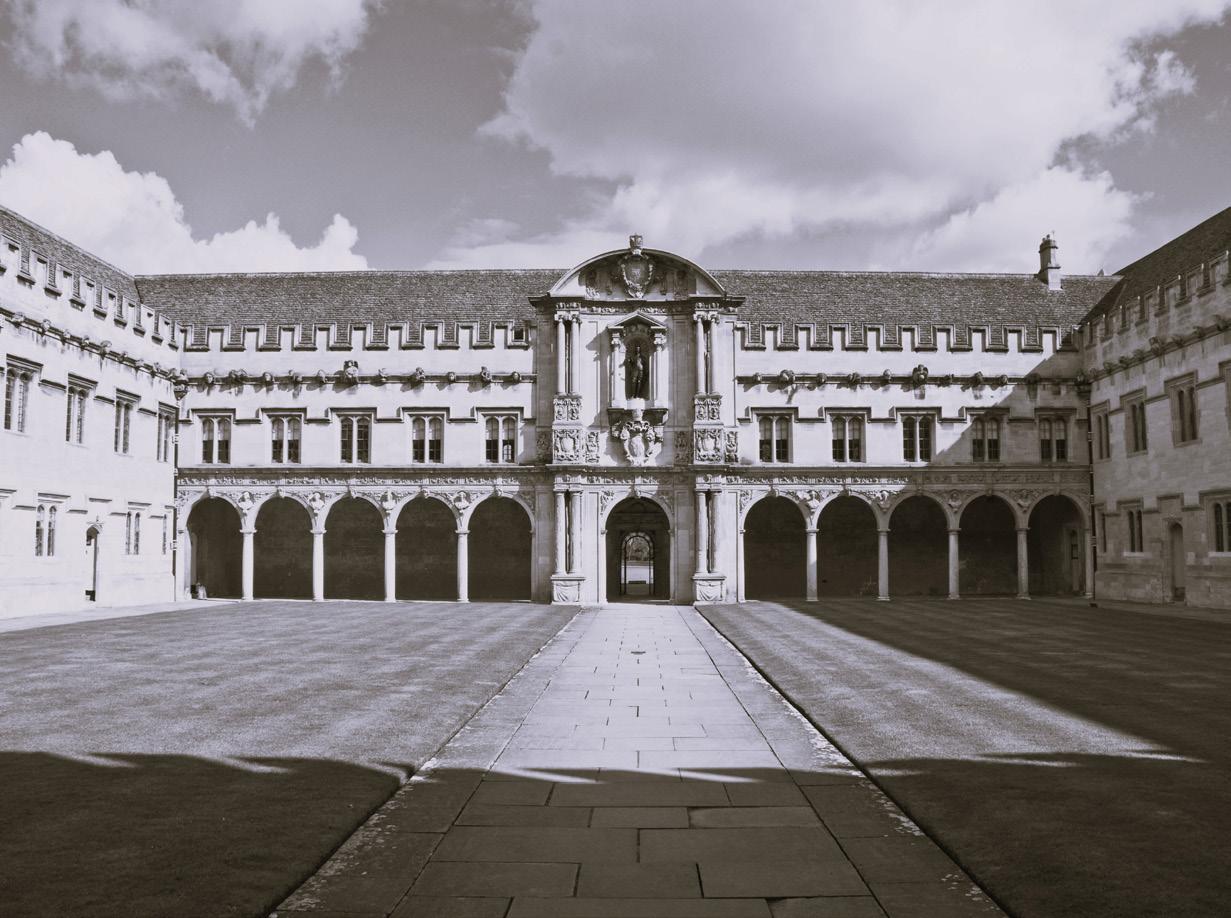
Heckyll and Snyde
- St Johns to set up own nation state -
Luxembourg already seeking trade deal.
Following disputes with the University of Oxford, St John’s College, formerly a member of said university, has decided to part ways with the institution. Tensions began following the University’s rejection of St John’s swimming pool planning application, stating that it would make the college “too desirable” for potential students. Some weak protestations were also raised against the “necessity” of flooding Trinity to do it. Outraged at the University’s blatant disregard for St John’s obvious superiority, the college decided a separation was long overdue, giving in to student calls for a separate nation state. When asked about this landmark decision, the President of the new Republic of St John’s College said that “it was simply time - this decision was inevitable. While our time as a part of the University will always be treasured, St John’s is now due a fresh start,
away from an institution that only wants to keep us down. Their inability to recognise our pre-eminence amongst the other colleges has been an ever present thorn in our side that has begun to seriously affect the mental well-being of our staff and students. So we’re putting an end to it. This may be one small step for the President, but it’s a giant leap for John kind.”
The students of St John’s, while sharing less of the President’s enthusiasm, still appeared in favour of this decision. One student we asked said he was “pretty happy with the situation”, stating that “apparently the college is negotiating to rejoin the EU - the St John’s passport is going to be one of the strongest in the world - it’s going to be mauve.”
St John’s head bursar is set to be in charge of the logistics of the partition but doesn’t appear at all daunted by the position. In an interview with the OxStu, the bursar claimed, “St John’s already has more land than the Vatican and a national ambulance service to boot - I can’t see how turning us into
an independent nation state could be much more work.”
The University refused to discuss the topic at any real length, claiming that they were still going through “a period of mourning”, though mutterings were heard about getting in touch with contacts at HMRC. A candle-light vigil will be held outside Najar’s for those who feel distressed by the situation.
Students warned of fire safety, particularly those in flammable clothes, or those who have made enemies of the Oxfordshire Fire Services
In the wake of the South Park fireworks show, Oxford City Council has decided that, to combat environmental damage done to the lawns of the park, next year’s show will take place in an airship over the city. Punters will board at 7:30pm, before being lifted high over the city for an evening of family fun. Officials acknowledged concerns that the blimp might sustain a puncture on one of Oxford’s many incredibly pointy spires, but assured the OxStu that the ship would be high up enough to only gently graze Christ Church Cathedral. When asked whether setting fireworks off in a large balloon full of hydrogen was a good idea, one coughed quietly and they began to mutter amongst themselves. As we looked closer, we noticed one was wearing a t-shirt that read ‘I heart the Hindenburg disaster’. We’re not sure where he got the shirt from.


Rordan Gamsey
We’re a little more than halfway through term and Rordan is knackered. Having neglected this column thus far, he thought he should probably write something before the whole place goes up in flames.
The Union has unfortuately been the subject of a few headlines so far this term and Rordan needs a break. The institution seems to have confused its goal of promoting free speech with a mandate to speak freely ad nauseum on any and every half baked thought to cross their minds.
Accessibility has been the much lauded aim of the recent reform efforts. Rordan maintains that the primary obstacle in this struggle is not
racism, nor sexism, nor even nepotism, but the sheer complexity of the rules which defy understanding.
It’s fifth week and Rordan is feeling the blues. Despite his college’s ardent efforts to provide welfare, Rordan’s instinct at the moment in to curl up into a ball and hibernate until the sun returns and it is punting season once again.
Rordan thought that by now colleges would have realised that seasonal depression cannot be cured by a subsidised hot chocolate, and a movie night is only really enjoyable as an excuse to take a nap. The closest college events are those providing ample liquor in which to drown your sorrows, but even that can only sem the flow of tears as long as the flow of alcohol is uninterrupted.

sport@oxfordstudent.com | Deputy Editor: Johannes Riese
Section Editors: Zohaa Butt, Caitlin Clarke, Ned Preston
Correspondents: Haris Book, Gaspard Rouffin

Corruption claims, bad-tempered meltdown and unprecedented fallout. This was the forecast of many political analysts on the eve of the US election; however, these scenes actually took place a week prior in the French capital with the crowning of the Ballon d’Or, football’s most prestigious individual award.
Manchester City and Spain’s Rodri made history on the
“ Both players had equally poised and convincing claims to the award
night becoming only the second Spanish footballer to reach this peak and the first true number 6 to win the award. However, the night was marred by the glaring absence of Real Madrid under the auspices of a boycott at the perceived ‘disrespect’ of Vinicius Jr failing to win the award de-
spite having been the odds-on favourite until the day.
The fallout has proven monumental and the spotlight snatched away. A night designed to celebrate the acclaim of Rodri’s ascendency to footballing immortality has only produced polemics on the egoism of Madrid. Even the dogmatically loyal Marca expressed dismay at their ac tions.
Both players had equally poised and convincing claims to the award. Vinicius jr was decisive and clinical all sea son: winning the Champions League with a goal in the final, La Liga where he averaged a goal every 89 minutes, and the Spanish Super Cup in which he scored a hat-trick against Barcelona. On the other hand, Rodri was instrumen tal in City’s record-breaking fourth consecutive Premier League and Spain’s triumph at the Euros where he won the Player of the Tournament award. Either player would have been a worthy winner and the other an unlucky runner-up.
ing to find any considerable form as his country was eliminated in the quarterfinals at Copa America. While Rodri shined for his national team over the summer, Vinicius faltered.
The Ballon d’Or is by no means an award free of con-
able right of any individual. Nor can it claim complete objectivity by virtue of being conducted as a vote. But its allure and desirability is un rivalled in world football. So why has the focus this year been on describing a petty tantrum rather than waxing lyrical brilliance on Rodri’s performance?
Real Madrid has pointed towards corruption within the mega-politics of football as the true reason their man lost. They claimed “It is ob vious that the UEFA Ballon d’Or does not respect Real Madrid. And Real Madrid is not where it is not respected.”
this extent, yet believe they are being overlooked requires an act of unequivocally su-

Their argument hinges on the association of the event with UEFA, with whom tension has been strife since their involvement in the breakaway Super League. Yet the political landscape Madrid is envisioning is simply nonsensical. Yet the

For many the difference was their contrasting international campaigns. The Brazilian was lacklustre for his nation, fail-
al goalscoring records due to the Argentinian’s instrumental role in winning the World Cup, even with a poor domestic campaign for Barcelona. The award is not the divine prerogative or inalien-
boycotted the event, Madrid did not actually claim a single prize in person. An issue born entirely of their own volition. To have their achievements recognised and celebrated to
The other absurd element of Real Madrid’s mental gymnastics within their imagined political paradigm is their adoption of a siege mentality. Their actions and words show they view themselves as underdogs fighting the system. An utterly ironic concept given their ubiquity with the state and economic dominance in both Spanish and European football. Their reaction alone to their perceived injustice is enough to unequivocally show that Ro-
“ Madrid has reduced the most high-profile night in football to sheer pantomime and through sheer egoism
dri’s victory was just and worthy. But the award no longer matters. Madrid has reduced the most high-profile night in football to sheer pantomime through egoism alone. The incredulity of their attempts to justify the unjustifiable is banal. The petty entitlement of one club has become the story and completely detracted from the winner himself. Yet it cannot be emphasised enough that whatever Real Madrid believes, Rodri is a truly deserved winner of the Ballon d’Or.
Rachael Gunn’s breakdancing performance for Australia was one of the most memorable moments from this year’s Olympic Games in Paris. Known as “RayGun”, she became internet phenome non, though not for the reasons she may have hoped. She ac tually failed in the first round, having been awarded zero points by the jury, which sparked vi ral mockery on social media.
Social media reactions ranged from disbelief about her unusual moves, such as the “kangaroo hop”, to con spiracy theories of how she managed to represent Aus tralia in the Olympics at all. Rachael herself still appears confident and counters that her winning the Oceanian Championship in 2022 speaks for itself. Her Olympic per-
formance went viral through negative criticism and ironic fan support but also gave her a platform for which she seems to be thankful.
RayGun said it was “amazing

represented in the next Olympic Games in Los Angeles.
Even though Rachael has received mental support and has gone off social media immediately after her performance,
she explains that breakdancing has turned from being her “medicine” into her “source of stress”. As a PhD holder in culture studies, specialising in the lack of representation of marginalised communities in breakdance, she was also exposed to claims of hypocrisy, relating to her representing Australia as a white, middle-aged woman.
Eventually, last Thursday, she appeared on the Australian news and talk show television program “The Project”, where she claimed that the rumours of her retirement had been blown out of proportion again. She explained that “RayGun’s not retiring. [...] Because it’s different in breaking culture,” meaning she will still attend non-professional breaking events. Nevertheless, she implied her retirement from professional competitions, such as the Olympics,
referring back to her interview with Today FM, where she stated that she does not see
“ Social media reactions ranged from disbelief [...] to conspiracy theories
herself competing anymore. Thus, her semi-retirement is received just as controversial ly as her dance moves in Par is. Much of the online com munity still disparages her for apparently enjoying the atten tion and refuting the criticism of her performance in Paris. Nevertheless, one may hope that the light she has shed on breakdancing can shake off its negative association and continue to inspire and shape dancing culture.
OUAFC Men’s - Birmingham City, 2-2
The Men’s Blues football team drew the game in regular time, but ended up winning 5-4 on penalties.


OUBCC Men’sNottinghams 3s, 115-37

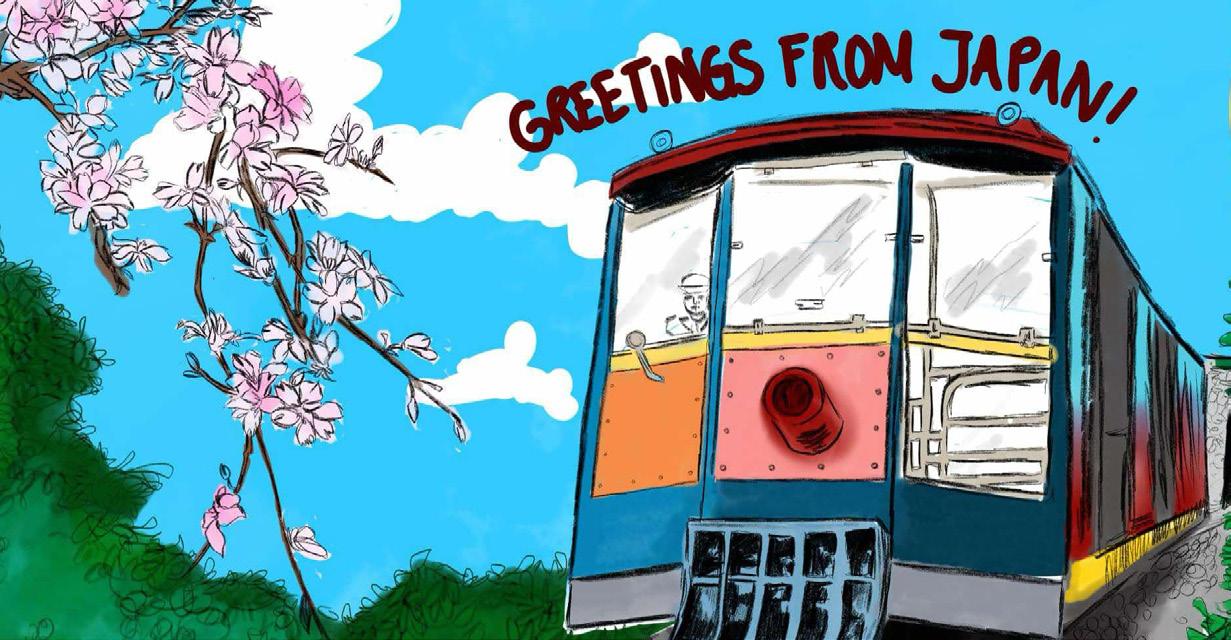
Within the first 5 hours of arriving in Japan, through the fogs of jetlag and overwhelming humidity I came to one concrete conclusion: Japan hates me. It seems that after all these years my first love has gone unreciprocated. Granted, the early warning
signs were there. Firstly, why would the one I love put me through the hellfire of acquiring a VISA with mere hours to spare before catching my flight? Secondly, why would my beloved subject me to 35-degree temperatures that feel like 40 given the oppressive humidity? And lastly, why would the object of my affection lie to me, as I spent
a year in Oxford painstakingly memorising Japanese grammar and sentences, only to realise that no one actually speaks that way? It was truly humbling to have to use Google Translate to order a coffee. Hence, in Narita Airport, Tokyo, my wee heart was broken. I fell in love with Japan five years ago when I took a trip to visit family in 2019. I grew up familiar with the sound of Japanese, as my aunt, who was born in Japan, often spoke to us in the language. My curiosity grew more as I got older. When I visited the town she grew up in, Komatsu, I felt instantly at home. The beauty of the countryside; the slow pace of life; the kindness of the people; the meticulous organisation of public transportation and the respect for others and
nature struck something inside of me. From then on, it always felt right to me that I would end up in Japan.
In the wake of my overt negativity, everything following the first 5 hours of the year abroad took a positive trajectory. Upon arriving in Kobe,
“ It seemed after all these years that my first love has gone unreciprocated
the city I will call home for the next year, the image that was once a dream slowly merged into a reality. Kobe University rests on the side of Mount
Rokko, and while the hills, with what feels like a 90-degree incline, take some getting used to, the view from campus is arguably one of the best in Japan. Standing there alongside nine other Oxford students, looking out over the Kobe skyline, made all the struggle and frustration of first-year worth it. Making friends has proved difficult in terms of language barriers. Past a very basic self-introduction, making deeper connections with other university students isn’t easy. Pushing myself out of my comfort zone, I decided to join the university bouldering team. When in doubt, trust that climbers are the nicest people you will ever meet. Read the full article online at oxfordstudent.com
After a few weeks of cancellations due to unforeseen events, parkrun has returned to Oxford University Parks. If sitting in the library all week makes you want to get active, enjoy the fresh air and connect with people, why not join hundreds of other participants on a 5k course through the parks?
Parkrun is a sports event entirely organised by volunteers, describing itself as “free, fun, friendly”. It takes place every Saturday at 9 am and apart from a free registration before joining for the first time, participants are not required to make any more administrative effort. What is left is the fun part. It does not matter
whether you are a professional striving for a new personal best, you would like to get into
“ The event is very inclusive to people regardless of their age or gender “ You are welcome to tailor your own experience and make the most of out it
running as a beginner or complete the 5k course by walking it. Between the 709 participants last week there were recorded times from 15: 58 to 1:09:17, so you are welcome to tailor your own experience and make the most out of it.

ACROSS
1. Converse about third-rate piece of clothing [4]
3. Amazingly anagram cat to get act! [5,5]
10. Russian River’s used to heal people? Mystifying [7]
11. See sign of renewed beginning [7]
12. A tree and its remains [3]
Attendees especially enjoy the views during the course which is mostly flat and leads through Oxford University Parks in two laps. Much deserved praise goes to the volunteers who work hard to provide a well-organised event each week by providing inductions, checking the course or clocking the times. And in case completing a 5k is not rewarding enough, the organisers offer a post-parkrun coffee at Common Ground Café, a perfect chance to get together and talk about what you could not do during the run.
Parkrun also lives up to being extremely friendly and welcoming. The event is very
inclusive to people regardless of their age or gender. It is also regularly attended by not only British tourists training to collect the letter “U” for their
parkrun alphabet, but also by international tourists from around the world. You can even take your dog with you!
The organisers are consid-
erate not only of their participants’ welfare but also of University Park’s regular visitors as well as the environment. On their website, attendees are advised to be aware of their surroundings and to give way if necessary in order to keep the experience enjoyable for everyone. The environment, which is crucial to the experience, is also emphasised by promoting a green arrival by foot, bike, or bus. Thus, the activity is made enjoyable for everyone.
So if you are looking for a free, fun and friendly activity this weekend, get your own taste of the 5k course through University Parks this Saturday.
13. Hoodlums beheaded after first snatching Australian’s thongs [7]
14. Intern at the French church [6]
17. Art chores performed by group of musicians [10]
20. Friendly about English relative [5]
22. Five hundred poorly made
bets lead to bankruptcies… [5]
25. Controversial leader wrongly censored? Become even louder! [9]
28. City life in France not nice, initially [6]
29. Loud beau confused when without a letter [6-1]
32. Artist’s absurd political affiliation [7]
35.Heideggerhasonecocktail[7]
36. Writer of music: it drove men insane [10]
37. Song performed by that individual [4] DOWN
1. Heartlessly argue about these [10]
2. Poison involved in scare: it was chaos! [7]
4. Return of bygone period to a small collection of places [5]
5. Horrors mayor recounted, following dark times [10]
6. Charles running scam [3]
7. Decide to sort it out [7]
8. First and last show off likewise [4]
9. Transform one’s writing into smut a teen might hide away [7]
15. Individual able to be age-less [3]

16. Our violent upheaval! [10]
18. Heist oddly a huge success [3]
19. Game’s unusual tactic involves part of foot [3,3,3]
21. Anger this setter has when faced with theology [3]
23. Note: sadly, it rains interminably, here [7]
24. Lust, perhaps, is fashionable [3]
26.InsectsmakenoiseroundSpanishfood[6]
27. Fully in error: do away with it [7]
29. Study medicine in building like in some way the Rad Cam [5]
30. First half of the alphabet’s a tiny thing [4]
31. Noise made by pigeon when half cooked [3]
34. Drink’s garnish nicer when peeled [3]